5 Volumes
Revolutionary War Era
The shot heard 'round the world.
Constitutional Era
American history between the Revolution and the approach of the Civil War, was dominated by the Constitutional Convention in Philadelphia in 1787. Background rumbling was from the French Revolution. The War of 1812 was merely an embarrassment.
Philadephia: America's Capital, 1774-1800
The Continental Congress met in Philadelphia from 1774 to 1788. Next, the new republic had its capital here from 1790 to 1800. Thoroughly Quaker Philadelphia was in the center of the founding twenty-five years when, and where, the enduring political institutions of America emerged.
Robert Morris' United States
Robert Morris of Philadelphia created many of the best features of the United States. His face might be carved on Mount Rushmore if he hadn't created one really bad feature, as well.
Worldwide Common Currency and Corporate Headquarters
The Death of Money
Robert Morris and America
Robert Morris was an energetic problem-solver. In solving those problems he devised some innovative solutions which have become such axiomatic principles of a republic and its economics, that his name is seldom associated with them.
Robert Morris Invents American Banking
The finances of our new nation were subject to many violent swings from the day the British abandoned Philadelphia in 1778 right up to the end of the war in 1783, but things steadily turned for the better after Robert Morris took charge of the Department of Finance in 1780, and particularly a year later when he was given the confusing title of Financier. Those two-mile stones could be marked in another way; with the establishment of the Bank of Pennsylvania in 1780, and then a year later the Bank of North America. Both institutions were products of the Morris imagination, matching the evolving state of his thinking. But the politicians only permitted these innovations after bitter battles, so in a sense, they matched what he could accomplish politically, in two steps grudgingly forced on him by the world's reluctance to trust his ideas. It remains unclear which innovations originated with Robert Morris, and which ones were derived from the Swiss economist Jacques Necker, who had become the French Minister of Finance, or Adam Smith whose Wealth of Nations was published in 1776. There were obvious similarities in the approach of these men, and a means of communicating existed through Silas Deane in Paris. Curiously, Necker was primarily famous in Europe for shrinking the bloated and corrupt bureaucracy of French financial administration. It is not irrelevant that whenever clear thinking replaces floundering, waste and abuse begin to subside.
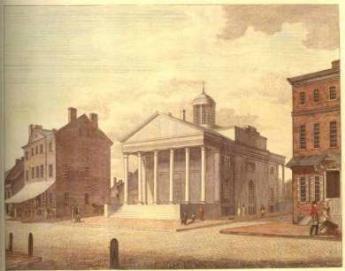
|
| The First Pennsylvania Bank |
The Pennsylvania Bank of 1780, unrecognizable today as a "bank", resembled a modern bond fund, operated as a partnership. It initially raised 300,000 pounds mainly from wealthy merchants, in return for interest-bearing 6-month notes. That money was promptly used to buy 500 barrels of flour for the troops at Morristown NJ. The bank thus served to transfer private funds to public purposes, which was what a rich nation urgently needs when its troops are starving.
It is always difficult to propose new ideas; in this case Morris also had to overcome resistance to taxes, which many citizens thought the Revolutionary war was all about. Taxation is, undeniably, a form of confiscation. When danger is clear at moments of panic, voluntary contributions may suffice; it is then almost sufficient to pass the hat. Soon enough, however, the government needs to increase incentives to induce the public to take the risk, hence interest rates offered by the bank must become market-driven, responding to negotiated public opinion. In short catastrophic wars for survival, a nation can gambles all its resources heedlessly. But steadily financing an eight-year war ultimately becomes a constant search for acceptable ways to transfer enough private wealth to cover the military effort, but not enough to stir up inflation. Floating interest rates, ultimately based on prevailing public opinion, do offer a match with changing prospects for victory or defeat, but only when they are not tampered with. Mismatches between public opinion and interest rates might seem tempting short-cuts to government, but they lead to inflation, price controls, rationing, and shortages of goods.
 There is nothing more difficult to take in hand, more perilous to conduct, or more uncertain of success, that to take the lead in the introduction of a new order of things. 
|
| Niccolo Machiavelli --The Prince |
In the United States in 1780, a huge disparity between the sudden wealth of privateers, and the abject poverty of Washington's army provoked trouble. At a time when the army was barefoot, Robert Morris' personal wealth was estimated at eight million dollars, but it seems likely the contrast between barefoot soldiers and free-spending privateer sailors was even more divisive since recruitment preferences were affected. The government tried many things: inflation default, devaluation default, confiscations, and even a few timid taxes. That duty was even proposed in Congress to be levied on the prize captures of privateers, suggests the public was alert to windfall profits. But it seemed oblivious to the principle that if you tax something, you get less of it; Congress was effectively proposing to punish the capture of British ships.
The idea of some sort of bank first came to Robert Morris less than a week after he stepped forward into the rioting streets to offer ten thousand pounds of his own money for assistance to the army, and induced several dozen of his friends to be similarly generous. It was not only necessary, but it was also nation-saving. In the previous ten months, the Continental dollar had been devalued forty to one, and then later 65 to one. No one would trust such a currency, whose consequence was certain to be a military disaster. But Morris obviously also knew that winning a war run by private subscription was unlikely to last much longer than one which depended on inflated paper currency and price controls. Petaliah Webster, a brilliant economist for the day, published pamphlets sarcastically comparing price controls to the religious conversion of a prisoner on a torture rack.
Therefore, passing the hat was also only an expedient. A week later Morris reorganized the concept to be The Pennsylvania Bank, where variable interest rates would induce reluctant lenders to lend. It was perhaps one or two steps better than losing the war, but it was primitive and limited. So, although Morris had originally opposed the war for independence, and the public certainly wasn't thrilled with taxes, market-driven interest rates were about all the Continental Congress would tolerate, as a compromise between confiscation and begging. The principle of free-market interest rates worked, in the sense that the army was able to fight on for several more years, but ultimately the soldiers revolted for lack of pay. It was notable that the Pennsylvania Line led the mutiny, or protest march, from Newburgh NY to the doors of Congress, and George Washington came close to giving the troops his tacit approval.
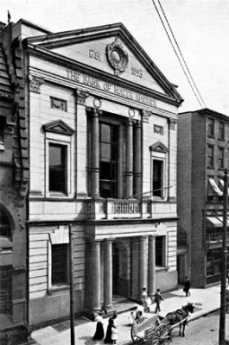
|
| The Bank of North America |
Well before matters came to that crisis, The Bank of North America, similarly attracting risk money by paying interest, was established in 1781 with an additional feature of generating side revenue through commercial 30-60 day loans. It was brilliant politics since Congress (with difficulty) agreed to permit a private company to engage in commerce but would never have tolerated the government doing so. When the goal is to transfer money from the private sector to the public one, the public insists on the ability to limit the amount. Otherwise, the transfer is a confiscation. Morris soon realized there was a missing third step. If the wealth of the nation was pledged to repay the war debts, creditors would insist on knowing the government's plans for repayment in case the bank couldn't do it. With the states retaining the right to tax but refusing the Federal government the right to tax without permission, the bonds of the Bank of North America were riskier for investors than they needed to be. In the difficult later years of the war, dependence on French loans began to look unwise, so the inability of the Federal government to confiscate private assets began to worry creditors. Somehow, Morris seemed to think the unratified Articles of Confederation were the problem and forced their ratification five years late. It didn't help matters, however, finally making it clear that the debt problem could not be solved without a new Constitution. When the soldiers did start to revolt, it became absolutely necessary to do something. Ultimately, the Constitutional Convention of 1787 was the result. In the meantime, the United States almost did collapse after the Battle of Yorktown (1783), and the French Revolution of 1789 is plausibly blamed in large part on our failure to repay the huge French financial support of our independence. A nation which pledges its full faith and credit behind war bonds must somehow convince its creditors that it intends to repay its bondholders, almost as fully as it intends to survive the war.
of pledging the full faith and credit of the nation through imposing taxes as lender of last resort. You don't need to pay for the whole war with loans, but you do need to reassure creditors that you will tax to repay your debts rather than default on them. That is, loan repayment is placed "ahead" of taxation. If even that structure proves inadequate, well, your war is simply not winnable because it provokes a dissolution of the government. The American public in 1781 did not need to understand the logic; it had just watched the process in grisly action. The public would not accept banks backed by federal taxation except as a wartime expedient, and therefore Robert Morris failed in his most important proposal. Although he continued to press for this essential feature for nine more years until it finally succeeded, a second near-miracle was that he kept the nation solvent in the meantime. He achieved this with a breath-taking combination of expedients, energy, ingenious fixes, and bluff. But the Treaty of Paris did not come a day too soon. In characteristic fashion, he did a quick about-face and proceeded to manage a huge personal fortune during a post-war convulsion.
In late 1779, before Morris would accept the job of rescuing the finances of the floundering new Republic, however, he meant to set some things straight. Congress must therefore first agree:
-- That Robert Morris would not accept the job unless Congress agreed that he could retain all of his private partnerships. Ben Franklin had warned him how ungrateful the public could quickly become, and what a short memory it had for those who performed favors. The Congress was infuriated by such demands, but Morris was adamant. Lucky for him that he was, because his enemies soon emerged with that age-old question, "Yes, but what have you done for us, lately? " -- That Morris has the power to dismiss any and all persons concerned with public finances and the public tender laws, for a cause. --That it was acknowledged that he assumed responsibility only for new debts, not those which preceded his taking office. -- That he has the right to delay taking the oath of office, retaining his seat in the Pennsylvania Legislature, until the relationship was clarified to give him effective control of state finances.
It can be imagined how displeased the Congress was with these high-handed stipulations, but they agreed to them.
Within three days of assuming office, -- Morris announced plans for the Bank of North America, our first true bank. -- Asked two personal friends, Thomas Lowrey, and Philip Schuyler, to buy one thousand barrels of flour on their own credit. He added, "I must also pledge myself to you, which I do most solemnly as an Officer of the Public. But lest you like some others believe more in private than in public credit I hereby pledge myself to pay you the cost and charges of the flour in hard money." -- Argued eleven points against the issuance of more paper money, particularly its requirement to be accepted as legal tender: "Because the value of money and particularly of paper money, depends upon the public confidence, and where that is wanting, laws cannot support it, and much less penal laws. . . Penalties on not receiving paper money must from the nature of the thing be either unnecessary or unjust. If the paper is of full value, it will pass current without such penalties, and if it is not of full value, compelling the acceptance of it is iniquitous." -- Arranged for the sale of western lands, to raise money. -- Acknowledged the Army was owed its back pay. -- Changed the War, Marine, Treasury, Foreign Affairs from committees of Congress to permanent departments.
Limits of Leverage
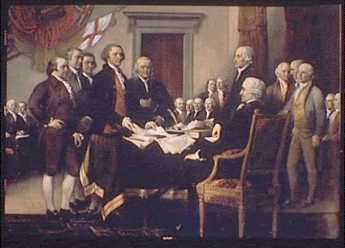
|
| Continental Congress |
PHILADELPHIA was the seat of the Continental Congress, hence the nation's capital, from 1774 to 1790, with two periods of abandonment. After the ratification of the Articles of Confederation in 1781, it became the Confederation Congress. When the British had occupied the city in 1777-78, "the Congress" fled to Baltimore, then to York, Pennsylvania, but returned as soon as the British left. The second period of the flight was occasioned by the near-mutiny of the Pennsylvania Line for lack of pay in 1783, when Congress fled, in succession, to Annapolis, Trenton, Princeton, and New York, leaving General Washington's loyalties torn between sympathy for his starving troops, and firm loyalty to law and order. The chaotic situation suited the British, who dragged out peace negotiations after the Battle of Yorktown and came close to winning by stalling what they had been unable to achieve by arms. The finances of the French government were already stretched beyond what was prudent in view of their intention to invade the British Isles. The much more solvent British began to see India as a more attractive colony than America, particularly if the lucrative trade with Jamaica and other Caribbean islands could be maintained without the expenses of the rebellion. Eight years is a long time for any nation to continue a war without generating significant unrest at home.
 The Constitution did not change taxation much; it changed the people who control our borrowing. 
|
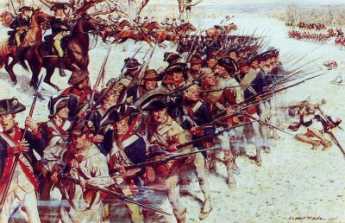
|
| Revolutionary War |
So, although the Revolutionary War was primarily started by British bungling which incited intemperate colonial hotheads into rash behavior, it was going to require a new Constitution and a realistic agreement about everybody's future, to achieve a workable peace. At the beginning of hostilities, only Robert Morris and John Dickinson talked as though they had done some clear long-term thinking, and they both opposed declaring Independence. They were shouted down and forced to go along or be banished. After eight years of fighting, however, a great many people could see that Dickinson may have been right to question the dubious unity of thirteen colonies, while a smaller group could even see that Morris might have been right to focus on Constitutional Liberty rather than regime change. Washington, although he was afraid of little else was fearful about his lack of education beyond grammar school; but at least he knew a country which would not feed its soldiers must be doomed to be no country at all. James Madison was scholarly and knew about Constitutions back to Aristotle, although events proved he had offered himself as a constitutional technician without clear personal goals for the product. Alexander Hamilton and Gouverneur Morris were adventurers, quite willing to shrug off the slogans of war and establish a king, that one form of government they were sure was workable. Only Benjamin Franklin among the colonists had stood before five kings, and of course before Vergennes and Wedderburn, where he could observe that all forms of government were in the hands of agents and intermediaries. But Robert Morris was a businessman who probably wanted little more than a workable set of rules, a level playing field, where he had every confidence that he would win, regardless of other rules for the game. Those rules at a minimum must include an equitable means for the government to pay its debts. As the richest delegate, in his own city, he was encouraged to act as a host for the convention. As host, he felt constrained to speak only about finance, his main concern anyway. Once this point was established fairly early at the Constitutional Convention, Morris had little else to say, even though he personally had many irons in the fire. Everything else, as politicians say, was for sale. Besides which he was accompanied by his personal lawyer but no relation, Gouverneur Morris, who was by far the most elegant speaker and persuasive advocate in the group.
Or perhaps the true flavor of his approach was, One Thing at a Time. Robert Morris was elected U.S. Senator from Pennsylvania in the first Congress under the new Constitution. He was in the center of almost every major debate, member of more than forty committees, often described as running on and off the floor, marshaling votes. The assumption of state Revolutionary War debts was perhaps part of his central drive to establish the full faith and credit of the United States. But the location of the new capital was quite a separate issue. Morris had bought huge acreage across Delaware from Trenton, in the area now known as Morrisville, and he lobbied hard and long to have the Capital located in Trenton, just as Senator Maclay lobbied to have it settle on his own land near Harrisburg. The New York congressional delegation, led by Alexander Hamilton, fought for a New York location, although Gouverneur Morris attempted to favor his own estate, Morrisania, in the Bronx. And of course, it was the Virginia delegation which finally won the prize, on the Potomac opposite George Washington's estate at Mt. Vernon. The location of the capital was important to Robert Morris, but as a realist, he then bought up large tracts of land in the District of Columbia. Owning two sites for a national capital at the same time was a major overextension of Morris' debts which helped lead to his final bankruptcy, although he was involved in so many affairs it is hard to say which was most significant. And indeed, his lobbying from debtors prison was the main source of a new bankruptcy law, which released him from prison. When Morris was seated in the Constitutional Convention, a large number of ideas must have been running through his head. But as far as we can tell, he largely held his peace, apparently content with the significant achievement of establishing federal taxation. Robert Morris had more ideas than anybody, and more energy than was good for him.
Over the centuries, the Constitution has been seen as a marvel of concise prose. Events have reversed the position of the political parties many times, but the Constitution does not change, so much as its meaning evolves. In the case of the federal ability to tax, however, almost nothing matches its malleability. The Revolutionary War was begun in large part because of a two-cent tax on tea, which was in fact a lowering of the tax rate. By the time of the Presidency of James Monroe, the federal debt had been extinguished by national prosperity. By the time of the Presidency of Barack Obama, the economy of the whole world, not just this one nation, is threatened by excessive indebtedness. The brilliant insights of Morris and Alexander Hamilton thus leveraged the industrial world into a situation which was unimaginable in the Eighteenth century. We are today nearly forced into economic recession, in order to pay down the national debt which computers concealed from us. If our creditors lose the faith we can reduce the debt, they will raise interest rates beyond the point where even the present debt can be sustained. The Constitution did not change taxation much; it changed the people who control our borrowing. The borrower is on a long leash, but creditors hold the other end of it.
 Tax References in the 1787 Constitution: Article 1, Section 2: Representatives and direct Taxes shall be apportioned among the several States which may be included within this Union, according to their respective Numbers, which shall be determined by adding to the whole Number of free Persons, including those bound to Service for a Term of Years, and excluding Indians not taxed, three fifths of all other Persons. Section. 7. All Bills for raising Revenue shall originate in the House of Representatives, but the Senate may propose or concur with Amendments as on other Bills. Section. 8. The Congress shall have Power To lay and collect Taxes, Duties, Imposts, and Excises, to pay the Debts and provide for the common Defence and general Welfare of the United States; but all Duties, Imposts, and Excises shall be uniform throughout the United States; To borrow Money on the credit of the United States; To regulate Commerce with foreign Nations, and among the several States, and with the Indian Tribes; To establish a uniform Rule of Naturalization, and uniform Laws on the subject of Bankruptcies throughout the United States; To coin Money, regulate the Value thereof, and of foreign Coin, and fix the Standard of Weights and Measures; To provide for the Punishment of counterfeiting the Securities and current Coin of the United States; To make all Laws which shall be necessary and proper for carrying into Execution the foregoing Powers, and all other Powers vested by this Constitution in the Government of the United States, or in any Department or Officer thereof. Section. 9. The Migration or Importation of such Persons as any of the States now existing shall think proper to admit, shall not be prohibited by the Congress prior to the Year one thousand eight hundred and eight, but a Tax or duty may be imposed on such Importation, not exceeding ten dollars for each Person. The Privilege of the Writ of Habeas Corpus shall not be suspended, unless when in Cases of Rebellion or Invasion the public Safety may require it. No Bill of Attainder or ex post facto Law shall be passed. No Capitation or other direct, Tax shall be laid, unless in Proportion to the Census or enumeration herein before directed to be taken. No Tax or Duty shall be laid on Articles exported from any State. No Preference shall be given by any Regulation of Commerce or Revenue to the Ports of one State over those of another; nor shall Vessels bound to, or from, one State, be obliged to enter, clear, or pay Duties in another. No Money shall be drawn from the Treasury, but in Consequence of Appropriations made by Law; and a regular Statement and Account of the Receipts and Expenditures of all public Money shall be published from time to time. Section. 10. No State shall enter into any Treaty, Alliance, or Confederation; grant Letters of Marque and Reprisal; coin Money; emit Bills of Credit; make any Thing but gold and silver Coin a Tender in Payment of Debts; pass any Bill of Attainder, ex post facto Law, or Law impairing the Obligation of Contracts, or grant any Title of Nobility. No State shall, without the Consent of the Congress, lay any Imposts or Duties on Imports or Exports, except what may be absolutely necessary for executing it's inspection Laws: and the net Produce of all Duties and Imposts, laid by any State on Imports or Exports, shall be for the Use of the Treasury of the United States; and all such Laws shall be subject to the Revision and Control of the Congress. 
|
Constitutional Liberty
WITH British troops in the process of disembarking at New Brunswick, apparently intent on hanging rebels, Robert Morris and John Dickinson annoyed everybody by refusing to sign the Declaration of Independence. Both were fully engaged in the Revolution after the fighting finally got started, and Morris signed up in August 1776. Dickinson had some further reasons of his own, but Morris explained his position quite succinctly. He didn't mind being a British subject, he didn't want a new King, what he wanted was Constitutional Liberty. There is no record of his being directly confronted about this later, and thus no detailed explanation. But whatever did he mean?
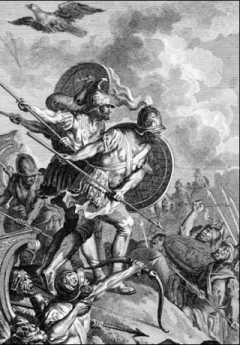
|
| Iliad and the Odyssey |
Morris was of course very bright, even brilliant as a businessman. He had an astonishing memory for detail and was capable of holding his own counsel. He was a person of great daring and prodigious amounts of work. But there is very little evidence that he thought it was useful to be mysterious, or deep. So why not take him at his word, which was essentially that what mattered in a government was whether it kept its promises and allowed its citizens all possible Liberty. It did not matter whether the government had a king, or seldom mattered much who that king was. What mattered was whether it kept its promises, and for that a Constitution is useful. There is no great pleasure in being capricious and arbitrary, so a king who leaves the citizens alone is mostly the best you can ask for. It does, however, help considerably if the rules are fair, clear, and binding. Beyond that, it is unwise to go about toppling governments in the vain hope that a new one is somehow better than the old one. This is putting words into his mouth, to be sure. What he did say was he saw no advantage to getting a new government when what we wanted was Constitutional Liberty. Eleven years later, he was a personal friend of just about everyone with the power to design a new government. Washington lived in his house, or in one next door. Ben Franklin was a business partner. Gouverneur Morris was his lawyer and partner. Just about everybody else who mattered was meeting with him in secrecy for months at a time, in the Pennsylvania Statehouse. And so on.
An essential part of this puzzle of Morris' role could be that the American Constitution was very close to unique in being written out as a document, like a commercial contract. The British Constitution was unwritten at the time and continues to be unwritten today. Many other members of the British Commonwealth operate without a written constitution. And in fact, what passed as constitutions for thousands of years have been unwritten; it was the written American one which was the novelty, not the other way around. It may stretch matters a little to describe the Iliad and the Odyssey as constitutions, but they do in fact describe the system of governance of the Ancient Greeks, clarifying many axioms of their culture for which they were willing to fight and die. We are able to understand the rules for Greeks to live by from reading Homer, almost surely better than we understand the rules of American culture by reading The Federalist Papers. Modern students of geometry, for another example, are taught that all the rules of Euclidian geometry are based on a few axioms stated at its beginning. Change one of those axioms, and you make mathematics unrecognizable. Even Newton's Principia are now seen by mathematicians to be rules which apply only to our universe for certain. There may exist many other universes to which they do not apply. Axioms are themselves mostly regarded as unprovable assumptions. A Constitution, therefore, is regarded in modern times to be much the same thing as a set of mathematical axioms. With one new exception: they are written out on a piece of paper for all to see and agree to -- just like a commercial contract. It would not be surprising to discover that America's great merchant trader, Robert Morris, was horrified at the idea of depending on Vestal Virgins or Judges, or Kings, for their recollection of what the contract says. It, therefore, seems quite natural for a maritime merchant to be agitated by having the rules of British society depend on what King George III chose to emphasize or ignore. Write it down, negotiate it, then tell us what you want so we can agree to it; that's a proper way to define Constitutional Liberty and limit disputes. International maritime trade could not be conducted in any other way, because sea captains who feel abused in a foreign port can abruptly up-anchor and sail away, never to return to that port again until or unless local rules are clarified.
Unless someone discovers some relevant documents in a trunk in the attic, that's about the best conjecture to be made about the American novelty of a written constitution, and its transformative effect on the legal system of all other nations which have one. It would still be nice to know, for certain, whose idea it was.
Who Paid for the Revolutionary War?

|
| Poker Game |
There's a saying in poker circles: never play against someone with lots more money than you have. The American Revolutionary War can be thought of as just that sort of poker game. The British could afford to lose what they lost, while somewhat smaller debts were quite enough to overwhelm the French. The cost of any war is a guess because it cannot account for death and destruction it provokes. But after a few years, it could be observed the British were holding the British Empire, while the French were left with the desolation of their own revolution. The Americans held most of a continent, free and clear, in return for their sacrifices, although their physical sacrifice was the greatest of the three main war participants.
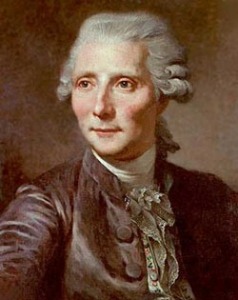
|
| Pierre Augustin Caron de Beaumarchais, |
Leaving the British aside, much of the money paid for the war passed through the hands of Robert Morris and Pierre Beaumarchais, so in one sense they paid for at least the munitions part of the war. At the time, Beaumarchais was penniless from a lawsuit, so he was a judgment proof manager of a dummy corporation, Rodriguez Hortales et Cie. The real payors were the French Government of 1 million livres, the Spanish Government of 1 million, and 1 million from several adventurous individuals. On the American side, Robert Morris was often personally responsible for defaults, as a result of the Continental currency made worthless from printing-press inflation. In a dramatic moment, Morris stepped forward and announced he and a few friends would stand behind the debts. Not only was Morris a wealthy man, but he was largely running the United States government. Among other considerations, he had a fairly good chance of inducing the government to raise taxes to pay its own debts before he would have to assume them. Many people doubted that ability, however. Even Morris' wealth would have been insufficient to carry the whole burden, so the guarantee he made must be seen as a form of default insurance or credit default swap, containing a high degree of risk. Regardless of details, if Great Britain won the war, both Morris and Beaumarchais would have been impoverished, and probably imprisoned. The main difference was that Beaumarchais was already broke.
Morris never forgot the message, that the real security backing the loans was the wealth of the North American continent. That's what America gained by winning, and that's what it would have lost if England won. If you win a war, buy real estate.
Power of the Purse
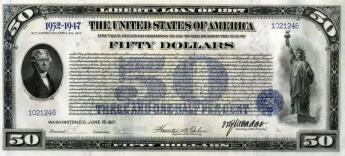
|
| Liberty Bond |
In 1917, Congress passed a law, quite possibly not understanding its full implications. From the founding of the republic until that time, Congress had approved the exact amount of each bond issue as enacted, neither more nor less. With the First Liberty Bond Act of 1917, however, Congress began to allow the administration to issue bonds as it pleased, up to some specified debt limit. Periodically since that time, as the amount in circulation approaches the debt limit, Congress raises the limit. No doubt this procedural change seemed like legislative streamlining, making it unnecessary for Congress to interrupt other activities to respond to a debt level which creeps up on its own time schedule. The overall effect of this change was significantly different, however, and probably unintentionally.
If the authorized debt limit is raised by large enough steps, it effectively amounts to Congress turning over debt decisions to the executive branch. Conversely, raising the limit only a small amount soon triggers a repeat request, which by routine becomes so inconsequential that Congress stops paying attention to it. Regardless of the size of the block grant, bulk authorization of blocks of debt results in the power of debt creation shifting toward the President. That was not what the Constitutional Convention intended.
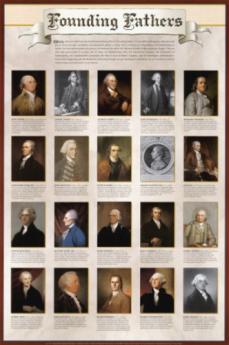
|
| Founding Fathers |
The Founding Fathers remembered taxation as one of the main issues of the revolt from England. Whether by King or President they had no intention of permitting the Executive to tax as he pleased; the issue traced back to the Magna Charta. Nor would they permit unlimited federal borrowing to generate escape hatches which would soon enough transform into higher taxes. Taxes, therefore, must originate in the House of Representatives, and bond issues were approved one by one. Following the 1917 liberalization, it required only fifty years before unrestrained bond limits reached a point where future national debt obligations loomed beyond the easy ability to pay them off. If they were ever pronounced unpayable by the international bond market, interest rates would rise, and eventually, federal bonds would become unsalable. With Greece, Portugal, and Ireland already flirting with bankruptcy, the approaching danger seems quite understandable to the voting public.
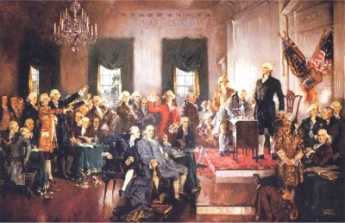
|
| Constitutional Convention |
The issue is constrained by another barrier. The Fourteenth Amendment to the Constitution, Section Four, forbids dishonoring "the validity of the public debt of the United States, authorized by law." Enacted after the Civil War, this Amendment was intended to prevent future states or congresses from reversing the Reconstruction Acts, but it has the additional effect of preventing future Congresses from dishonoring interest and debt repayments on existing debt. The present Congress, therefore, retains the latitude to prohibit the issuance of additional debt but is forbidden from dishonoring existing debt.
This seems like a good principle to re-emphasize, entirely disregarding the merits of the TARP, the Dodd/Frank Act, or Obamacare. Indeed, restating the Constitutional intent for Congress to be chiefly responsible for taxes and debts, seems like a very good thing to do, quite regardless of whether present national debt limits ought to be raised. The 1917 Act was a mistake, probably an unconstitutional one, and should be reversed. Holding conferences in the White House about whether to issue debt raises uncertainty about whose duty it is. The responsibility belongs to the House of Representatives, and should stay there.
Robert Morris Has a Mid-Life Crisis
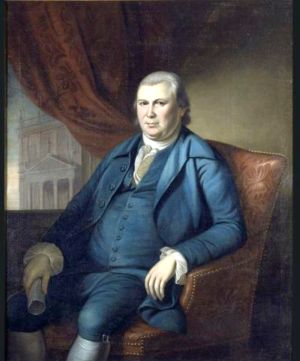
|
| Robert Morris |
The feudal system once consisted of Kings awarding aristocrats a title of nobility attached to a region of inhabited land, usually as a reward for military assistance. Because of this link between their wealth and their land, almost no aristocrats migrated to America, so almost no American can now claim hereditary noble descent. What developed instead was the gentry. Regardless of the often unclear sources of their wealth, it was presumed to have arisen from some ancestor's merit, and could only be inherited if it could be made to renew itself. The vast expanses of America cheapened the value of undeveloped land, so the gentry could seldom support a gentry lifestyle without additional employment of some sort. Their children went to college, an experience originally developed for training ministers, who were expected to be the nation's leaders in balance with the tradesmen, who made no secret of their own self-serving. The expectation of community leadership for the gentry outlasted its original attachment to religion, so the non-religious gentry moved about with an air of superiority which others envied but increasingly resented. The novels of Jane Austen are filled with depictions of this sort of person during a period when they were actually rapidly disappearing. The primitive financial system and the enduring mythology of the aristocracy struggled to guide the income sources of this gentry into tracts of resalable land, where they lived off dividends, profits, and rents. Rentiers. Not quite tradesmen, but not genuine aristocrats, either.
Unfortunately, the huge abundance of land in the New World soon cheapened its value to a point where it could not support a lifestyle of entitlement along with contempt for mere tradesmen. This is the explanation often offered for the virtual disappearance of the lifestyle of the Gentleman by the time of the Civil War. The situation was rescued by the invention of corporations; a single man or family no longer could supply all the capital needed to exploit the available commercial opportunities, so corporate ownership was shared with others. Ownership of shares in corporations provided a new stream of income and a new storehouse of wealth, and it also freed the gentleman from ties to a big estate of land. The Jane Austen variety of gentleman thus virtually disappeared but remained as a mythical model for the highest aspirations in the early 19th Century. Robert Morris, orphaned and illegitimate, wanted very much to be an immensely rich gentleman even though that was becoming a contradiction of terms. And although he had virtually been in charge of the whole nation during the Revolution, he wanted very much to be looked to as a leader, then defined as some variant of a theologian. Much of this ambivalence was due to his never going to college, the same guilt which haunted George Washington. Neither of them had sufficient college-educated relatives to appreciate how little college has to do with it. A great deal probably did have to do with historical animosities between Eastern and Western Pennsylvania, between Quakers and Presbyterians, between memories of lingering hatreds among Irish tribes along Ireland's northern border. And yes, between anthracite and bituminous coal. Mountains seem to foster wild behavior, and there are a lot of mountains in Central Pennsylvania.
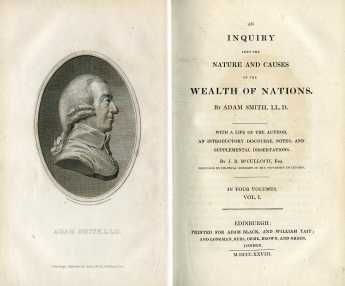
|
| Adam Smith: Nature and Causes of The Wealth of Nations |
The outcome of these commotions, as well as others unrecognized, was highlighted by the constant difficulties Robert Morris had in the Pennsylvania legislature, contrasted with his comparative ease in both the local Philadelphia political scene and the national one. Only at the state level did it seem that everyone was against him. Particularly so were Findlay and Smilie, western Pennsylvanians who hated him for his self-made wealth but refused to acknowledge the abilities it must surely represent. Like the Lees of Virginia, they asserted the burden of proof was on him, to prove he had not stolen his wealth. After all, all tradesmen were petty cheaters, so a very rich tradesman must be a big cheater. And even setting that aside, he had an odor of sanctity, an air of superiority, which they could not abide. There was even a centrality to this matter resting on Adam Smith, who published The Wealth of Nations in 1776. Smith argued that good things grew out of vigorous competition, and definitely not from altruism. Although Morris was sufficiently taken with Smith's arguments to give copies to his friends, he would not surrender the point that wealth was not necessarily proof of merit, just because merit sometimes led to wealth. Findlay freely admitted he was opposed to the re-charter of the Bank of North America in order to promote the self-interest of western farmers. What flabbergasted Morris was to hear his motives vilified for favoring the re-charter when he owned shares of the bank. Nowadays, everyone would feel astounded if a corporate executive did not vigorously defend his company; but in those days he stood shame-faced to admit he could not possibly be a gentleman and do such a thing. He, therefore, decided to prove his honor by taking an astonishing step. One of the richest men in America sold out his business to prove to these wizened backwoodsmen that he was truly acting like a gentleman. It would be hard today to find anyone who would not describe his action as that of a damned fool.
The Third Pennamite War (1778-1784)
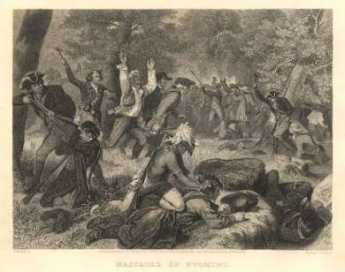
|
| Wyoming massacre |
And so, after the Revolution was finally over, there was a third war between Pennsylvanians and the Connecticut born settlers of the Wyoming Valley. This time, the disputes were focused on, not the land grants of King Charles but the 1771 land sales by Penn family, most of which conflicted with land sales to the Connecticut settlers by the Susquehanna Company. The Connecticut settlers felt they had paid for the land in good faith and had certainly suffered to defend it against the common enemy. The Pennsylvanians were composed of speculators (mostly in Philadelphia) and settlers (mostly Scotch-Irish from Lancaster County). Between them, these two groups easily controlled the votes in the Pennsylvania Assembly, leading to some outrageous political behavior which conferred legal justification on disgraceful vigilante behavior. For example, once the American Revolution was finally over (1783) the Decision of Trenton had given clear control to Pennsylvania, so its Assembly appointed two ruffians named Patterson and Armstrong to be commissioners in the Wyoming Valley. These two promptly gave the settlers six months to leave the land, and using a slight show of resistance as sufficient pretext, burned the buildings and scattered the inhabitants, killing a number of them. One of the weaknesses of the Articles of Confederation was thus promptly demonstrated, as well as the ensuing importance of a little-understood provision of the new (1787) Constitution . No state may now interfere in the provisions of private contracts. Those with nostalgia for states rights must overcome a heavy burden of history about what state legislatures were capable of doing in this and similar matters, in the days before the federal government was empowered to stop it.
A flood soon wiped out most of the landmarks in the Wyoming Valley, and it had to be resurveyed. Patterson, whose official letters to the Assembly denounced the Connecticut settlers as bandits, perjurers, ruffians, and a despicable herd, boasted that he had restored, to what he called his constituents, "the chief part of all the lands". The scattered settlers nevertheless began to trickle back to the Valley, and Patterson had several of them whipped with ramrods. As the settlers became more numerous, Armstrong marched a small army up from Lancaster. He pledged to the settlers on his honor as a gentleman that if both sides disarmed, he would restore order. As soon as the Connecticut group had surrendered their weapons, they were imprisoned; Patterson's soldiers were not disarmed at all and assisted the process of marching the Connecticut settlers, chained together, to prison in Easton and Sunbury. To its everlasting credit, the decent element of Pennsylvania was incensed by this disgraceful behavior; the prisoners somehow mysteriously were allowed to escape, and the Assembly was cowed by the general outrage into recalling Patterson and Armstrong. Finally, the indignation spread to New York and Massachusetts, where a strong movement developed to carve out a new state in Pennsylvania's Northeast, to put a stop to dissension which threatened the unity of the whole nation. That was a credible threat, and the Pennsylvania Assembly appeared to back down, giving titles to the settlers in what was called the "Confirming Act of 1787". Unfortunately, in what has since become almost a tradition in the Pennsylvania legislature, the law was intentionally unconstitutional. Among other things, it gave some settlers land in compensation that belonged to other settlers, violating the provision in the new Constitution against "private takings", once again displaying the superiority of the Constitution over the Articles of Confederation. It is quite clear that the legislators knew very well that after a protracted period of litigation, the courts would eventually strike this provision down, so it was safe to offer it as a compromise and take credit for being reasonable.
It is useful to remember that the Pennsylvania legislature and the Founding Fathers were meeting in the same building at 6th and Chestnut Streets, sometimes at the same moment. Books really need to be written to dramatize the contrast between the motivations and behavior of the sly, duplicitous Assembly, and the other group of men living in nearby rooming houses who had pledged their lives and sacred honor to establish and preserve democracy. To remember this curious contrast is to help understand Benjamin Franklin's disdainful remarks about parliaments and legislatures in general, not merely this one of which he had once been Majority Leader. The deliberations of the Constitutional Convention were kept a secret, allowing Franklin the latitude to point out the serious weaknesses of real-life parliamentary process, and supplying hideous examples, just next door, of what he was talking about.
A Change of Era
A maxim of the book-editor trade is "Deviate from chronology at your peril." Two events may have little to do with each other, but it always remains possible to show the earlier event had somehow affected the later one. An editor may know little about a topic, but he knows that much.
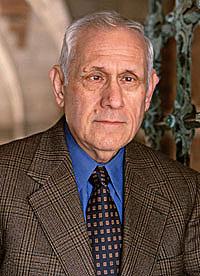
|
| Dean Donald Kagan |
In 2011, I was privileged to be a tuition-paying student at one of Yale's Directed Studies Courses. An invention of former Dean Donald Kagan, the DS courses take an important era in history and apply three conventional faculty disciplines to it at once: Philosophy, History, and Literature. For the undergraduates, courses range in chronology from Ancient Greek to the Enlightenment; so far, the alumni just get the Greeks. Judging only from the course in Ancient Greek, the unspoken thesis soon emerged that a major era experiences permanent changes in history, philosophy, and literature, but the connection between the three is often loose, requiring some pondering to make the connections firm. Aeschylus does have a connection with Plato, and Aristotle with Thucydides but it remains unclear why the connection exists. Furthermore, you can lump these things or split them; Ancient Greece fits naturally with the Roman Empire, but it can also stand alone. Therefore, although the Yale faculty tends to lump the American Revolution with The Enlightenment, a consideration of the life and times of Robert Morris, Jr. fits naturally with both the Enlightenment and the American Era, because the American part of the Enlightenment bifurcates abruptly when Morris stood in debate with William Findlay in the Pennsylvania State House in 1798 -- and lost.
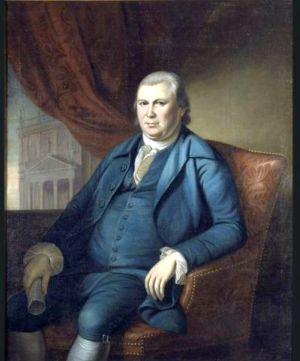
|
| Robert Morris |
Morris was the richest man in America or close to it, the unofficial President of the United States in its darkest hours, the most brilliant non-academic innovator in Western Finance, the leader of American high society, the only man beside Roger Sherman to sign the Declaration of Independence, the Articles of Confederation, and the Constitution. Morris did not realize it but he was within a few months of going to jail for three years, then spending his final five years in secluded disgrace. Robert Morris was not accustomed to closing arguments, but he lost this one, concerning the wisdom of renewing the charter of the Bank of North America, the first real bank of the country. He lost an argument he should have won easily. In retrospect, the new modern American Era was beginning, and he was apparently on the wrong side of it. Politically, that is. Speaking purely of banking and finance, he was a century ahead of his time.

|
| Ancient Greek Gods |
It seemed to me and my alumni classmates that the idea of examining a historical period like the ancient Greek one in the light of three different academic disciplines, gradually assumed considerable merit. The philosophy department examined beliefs which underlay action, and the history department described what those actions turned out to mean inhuman affairs. But the literature department came far closer than either of the other two, to imparting to a reader just what it was like to be an ancient Greek. Professor Kagan seems to have a really good idea here, although it must be resource-expensive to develop, academically. Three departments of Academia have to come to some sort of agreement about the whole synthesis, an agreement which surely must not have been present at the start. It must be a process highly similar to a medical school teaching about a disease, with coordinated input from pathologists, surgeons, and internists. A nice idea, but terribly labor-intensive of labor of the highest quality. Book editors would say it is safer to stick with chronology as an organizing principle if you plan to do a lot of organizing. Nevertheless, I must express my gratitude to Yale for allowing me to be a spectator at an experiment conducted by masters of the thinking trade. Its results must be judged by standards other than the usual ones.
Morris Upended by a Nobody
THE Revolutionary War ended militarily with the Battle of Yorktown in 1781, and diplomatically with the Treaty of Paris in 1783. The careers of Washington and Franklin appeared to be complete, while the economic and financial career of Robert Morris seemed likely to stretch for decades into the future. But as matters actually turned out for these three fast friends, it was Washington who was propelled into a new political career, Franklin soon died, and Morris got himself into a career-ending mess. The financial complexity and economic power of the United States did grow massively in the next several decades, but unfortunately, Robert Morris was soon unable to exert any leadership. At the end of Washington's eight years as President, the power of the Federalists, and particularly the three men most central to it, was coming to a close. John Adams had a tempestuous single term, and then Federalism was all over.
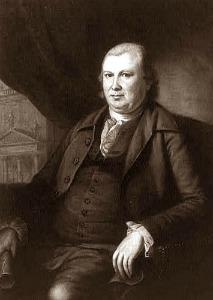
|
| Robert Morris |
The end of the Eighteenth century marked the end of The Enlightenment and the beginning of the Industrial Revolution, accompanied by many national revolutions, not just the American one. This was a major turning point for world history. The momentum of these upheavals still continues, but it is clear that the Industrial Revolution of which the Morris banking revolution was an essential part swept the world far faster than the social and political revolution, in which he also played a pivotal role. In the banking and industrial revolution, it is universally agreed that Morris was almost always right. In the social and political world, it is conversely agreed he was quite wrong. Essentially, Morris assumed that a small minority, an aristocracy of some sort, would rule any country. Within weeks of the ratification of the new Constitution, or even somewhat in anticipation of it, America made it clear that replacing an aristocracy of inheritance with an aristocracy of merit would not satisfy the need. Morris, born illegitimate and soon an orphan, was obviously in favor of promotion based on merit. John Adams defined leadership even more narrowly; he said a gentleman was a man who went to college, and he probably meant Harvard. Nobody extended the leadership class to include Indians and slaves, but the backwoodsmen of Appalachia made it clear that power and leadership at least included them. Thomas Jefferson was the visible leader of this expansion of the franchise, but changed his mind several times. James Madison switched sides; Thomas Paine switched in the opposite direction. The leaders of Shay's Rebellion and the Whiskey Rebellion lacked coherence and consistency on this point; instead of agitating for a refined goal, they mostly seemed to be running around looking for a leader. William Findlay, on the other hand, knew what he wanted. The issue might be defined as follows: it was obvious that hereditary aristocracy was too small and too inflexible to suffice, but it was also obvious that every man a king was too inclusive. An expanded leadership class was needed, but its boundaries were indistinct and contentious. But to return to Findlay, who at least had a clear idea of what he wanted.
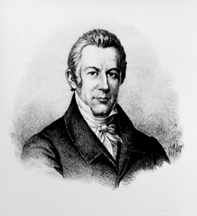
|
| William Findlay |
William Findlay was a member representing Western Pennsylvania in the State Legislature, in 1785. It would be difficult to claim any notable accomplishment in his life; he was largely uneducated. The new leadership class must, therefore, include both the uneducated and the mediocre. The Legislature at that time met in the State House, Independence Hall, in Philadelphia, where no doubt the unconventional dress and manners of backwoodsmen did not pass without audible comment. Findlay made his own political goals quite explicit; he was for paper money to facilitate land speculation which could make him rich. Wealth was a goal, but it did not confer distinction. The rights of the Indians, the rights of the descendants of William Penn, the rights of the educated class and the preservation of property were all just obstacles in the way of an ambitious man who had carefully studied the rules. Everybody's vote was as good as everybody else's, and if you shrewdly controlled a majority of them, you could do as you please. If this meat-ax approach had any rational justification, it lay in the essential selfishness of every single member of the Legislature, working as hard as he could to further his own interest. If someone controlled a majority of such votes, then the majority of the public were declaring in favor of the outcome. Those who believed in good government and the public interest were saps; the refinements of education mostly just created hypocritical liars. There was a strain of Calvinism in all this and a very large dose of Adam Smith's hidden hand of the marketplace. If you were rich, it was proof that God loved you, if you were poor, God must not think much of you, or He wouldn't have made you poor. Findlay had the votes and meant to become rich; if his opponents didn't have the votes, they could expect soon to be poor. In this particular case, the vote coming up was a motion to renew the charter of the Bank of North America. Findlay wanted it to die.
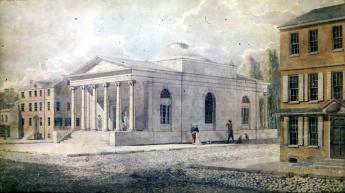
|
| America's first bank, the Bank of Pennsylvania |
It came down to a personal debate between Findlay, and Robert Morris. Morris had conceived and created America's first bank, the Bank of Pennsylvania. Today it would be called a bond fund, with Morris and a few of his friends put up their own money to act as leverage for loans to run the Revolutionary War. After a short time, it occurred to Morris that the money in a bank could be expanded by accepting interest-bearing public deposits and making small loans at a higher interest rate, which is the way most banks operate today. Accordingly, a new bank called the Bank of North America was chartered to serve this function, which greatly assisted in winning the Revolutionary War. There was no banking act or general law of corporations; each corporation had its individual charter, specifying what it could do and how it would be supervised. When the charter came up for renewal, Findlay saw his chance to kill it. Morris, of course, defended it, pointing out the great value to the nation of promoting commerce and maintaining a stable currency. The reply was immediate. Morris had his own money invested in the bank and only wanted to profit from it at the public expense. His protests about the good of commerce and the public interest in stable money were simply cloaking for this rich man's greed to make more money. Findlay made no secret of his interest in reverting to state-authorized paper money, which could then be used by the well-connected to buy vast lands in Ohio for speculation. There were enough other legislators present who could see welcome advantages, and by a small majority the charter was defeated.

|
| John Hancock |
At this point, Morris made a staggering mistake. After all, he was a simple man of no great background, largely uneducated but fortified by his ascent in society from waterfront apprentice to the highest of social positions, a friend of George Washington and Benjamin Franklin, acclaimed as a financial genius, the man who saved the Revolution, very likely the richest man in America. For many years, he had harbored not the slightest doubt of his personal genius, his absolute honesty, and total dedication to the welfare of his country. To have this reputation and accomplishment sneered at by a worthless backwoodsman, a man who would stoop to using the votes of other backwoodsmen to accomplish self-enrichment, was intolerable. Morris announced and actually did sell out his entire business interest as a merchant, at a moment when he fully understood the new nation was about to enjoy an unprecedented post-war boom. So much for his self-interest. It helps to understand that John Hancock and Henry Laurens had done the same thing in Boston and Charleston, against what we now see as a strange aristocratic tradition of prejudice against bankers and businessmen. In even the few shreds of aristocracy now surviving in Britain and Europe, the tradition persists that a true aristocrat is so independently wealthy that no self-interested temptations can attract him away from purest attention to the public good. The original source of this wealth was the King, who conferred high favor on those who served the nation well. A curious exception was made for wealth in the form of land, the only dependable store of tangible wealth, and transactions in land. Wealth was something which came from God and the King in return for public service. Land ownership was its tangible storage and transfer medium. Otherwise, grubbing around with trade and manufacture was beneath the dignity of a true gentleman.
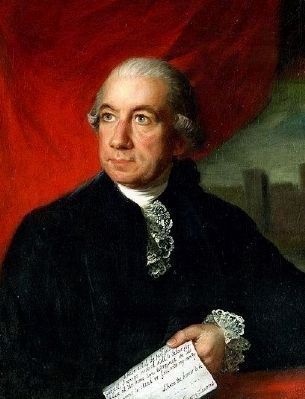
|
| Henry Laurens |
We now know what was coming. Wealth was soon to be the reward of skill and merit, recognized by fellow citizens in the marketplace, by consensus. Findlay and his friends wholly accepted this conclusion, unfortunately skipping the merit part of it for several decades. In their view, you were entitled to the money if you had the votes. As the nation gradually recognized that rewards must be durable, and once granted were yours to have and to hold, the new nation gradually came to see the need for durable ownership of property. Unless or until the owner places it out at risk in the marketplace, legislative votes may not affect its ownership. Our system ever since has rested on the three pillars of meritorious effort, assessment of value by the free market, and respect for pre-existing property. That's quite a change from the Divine Right of Kings, and therefore quite enough material to keep two political parties agitated for a couple of centuries. And quite enough change to bewilder even so brilliant a victim as Robert Morris.
Two-Party Ideologies
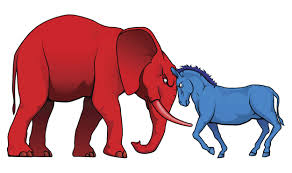
|
| Together |
Although they try to be subtle about it, the American political parties reverse their positions fairly often on issues. Indeed, there are several times when parties reversed positions with symmetry, each taking what was formerly the other party's position. For example, the Republican Party stood in defense of protective tariffs throughout the last half of the 19th century, while in the 21st century Democrats now take the pro-tariff position, and it is Republicans who hate it. If you look for the ideological center of the parties, it is not to be found in tariffs. Nor in taxes; the Federalists, effectively predecessors of the present Republican Party largely based their whole party on rewriting the Constitution to enable the Federal government to levy taxes. But more recently it might be fair to observe they allowed George Bush (41) to lose his 1992 presidential re-election campaign because he abandoned the "No new taxes" pledge. Twenty years later, the Tea Party is still on the warpath about holding taxes down. The difference between this Tea Party and the original (Boston)one is that now the Tea Party is in the hands of rock-ribbed conservatives instead of rowdy rebels.
On the question of how many parties to have, there is fairly uniform agreement that two is best. Third parties, or splinter parties, do appear from time to time but in retrospect can mostly be viewed as steps in repositioning one or both major parties. Our system of nomination depends on the utterly pragmatic question, "Can he win?", and cheerfully dumps some candidate the leadership really likes best if he seemingly can't win. The stability of our seemingly haphazard system emerges from two eventual choices, each chosen because shrewd analysts think they have the best chance with the public. The Constitution's authors hoped there would never be any political parties, but it is arguable that the remarkable stability of our government depends on them. More ideological leadership in other countries has led to many more political parties, each held by a tighter leash. The result has surprisingly been much less stability, because each splinter party is led by someone who imagines himself a Spartan at Thermopylae, determined to and usually successful at, dying for his cause. To those less cerebral about politics, one final pragmatic argument is offered: In our two-party system, the deals are made before the election, and the public is asked to choose between two best-effort products. In a multi-party system, the deals are made after the election, often requiring several efforts to get a workable coalition. And, having already voted, the public has surrendered its control over the composition of the deal.
Ginseng Trading
DECLARATION of a state of war between Great Britain and its colonies almost immediately set loose some thinking about how to divert some of the profits and commercial arrangements of the British Empire to other owners. In particular, the American merchants began to consider how to capture colonial trade with China, or at least look into what useful gossip they could pick up in the many dealings with sea captains in port, or traders in their counting houses. The waterfront has always been a tough place, and in the seaside taverns, it can be particularly difficult to get trustworthy information or form dependable commercial alliances. So it is not entirely surprising if the captains and agents of Robert Morris found themselves in the company of many seafarers who later proved to be little short of pirates. England was conducting a lucrative trade with China, and the American colonies supplied much of the commodities. The Treaty of Paris suddenly transformed smuggling and near-piracy into open season for international trade, with much room for sharp practice.
On February 22, 1784, the Empress of China, a brand-new copper bottomed vessel built in Boston for a dubious trader named Daniel Parker, set sail from Manhattan for Canton. John Cleve Green was the captain, and ownership was a confused tangle of William Duer, John Holker, and a firm of Turnbull, Marmie, and Company which was essentially a disguised agency of Robert Morris, with Morris the dominant owner. The ship had a cargo of two commodities: 250 casks of ginseng, and twenty thousand dollars in silver. The ship would return from China a year later, bearing tea, silks, and porcelain. The world was in a post-war depression, and the numerous part owners of the venture were barely speaking to each other. But five years later it was recorded that 19 American vessels were tied up in the port of Canton. Just whose idea it was, and who gets the main credit for making it a success can be endlessly disputed, both inside and outside the courtroom. But this was in broadest outline, how the China trade began.
The rest of the story is mainly a botanical one.
Statement of Accounts, March 1785
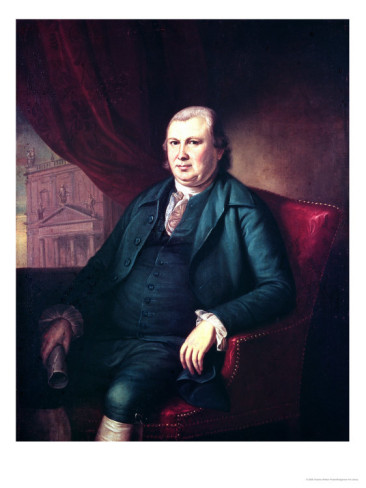
|
| Robert Morris |
AFTER resigning his position as Financier of the United States, Robert Morris worked for five months laboriously summarizing and detailing his official activities, and then he paid for printing five hundred copies of it. The document had a five thousand word preamble and over two hundred printed pages of detailed accounts, a prodigious effort. And a rather unprecedented one in an environment of traditional national secrecy about its accounts, except for the pioneering efforts of Necker in France. His reward at first was an infuriating discovery five years later that the government had not released his report to the public, and continued throughout this time to investigate Morris's earlier activities on the Secret Committee. The standard of bookkeeping for a secret committee engaged in smuggling arms before the Declaration of Independence was understandably obscure, and to have it flogged for failing to uphold the improved standards of government accounting which Morris later devised for the new nation was such a mixture of ingratitude and slyness that the behavior seemed well beyond infuriating. Nevertheless, it must have been gratifying to end the report with a positive balance of $21,000 even after eight years of struggle, war, and improvisation. The magnitude of this achievement was not lost on others in a position to see the contrast with earlier efforts, encapsulated by James Madison whose committee report concluded, "It appears to the committee that the regular official examination has already been made, and it would be inexpedient to incur the expense of a re-examination."
Madison by this time was evolving into a political opponent of Morris, but Samuel Osgood was a declared opponent of his approach to government accounts. Osgood's assessment of his opposition to the approach was prefaced with a ringing statement of its effectiveness: "I will tell you very freely, that in mere money transactions, he has saved the United States a very large sum... I am also of the opinion that much more regularity has been introduced into the keeping of accounts than ever before existed. This is a matter in my mind of very great importance. And without the strictest attention to it, the several states ought not to trust Congress with a single farthing of their money."
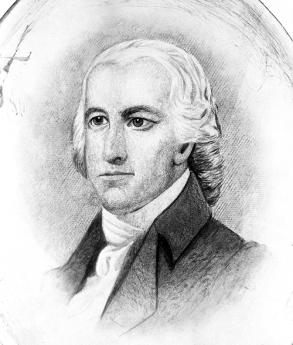
|
| Samuel Osgood |
The supreme irony of this situation was that by imposing strict accounting standards where none had previously existed, Morris was offering to his enemies a club to beat him with. Instead of recognizing that Morris was both too diligent and too rich to bother with cheating, there emerged a duel in which his enemies took unusual behavior to be a sure sign of wickedness, while Morris absolutely courted personal disaster, supremely confident he was unchallengeable.
There are two enduring truths to both positions. It is absolutely true that a well-informed public has a perfect right to do anything it pleases, regardless of the existing rules of government, regardless of the opinions of predecessors, heedless of the opinions of anyone else, past present or future. If a republic has supplanted a monarchy, the republic in a sense has the same divine rights. It's just unwise to act that way in anything but extreme circumstances.
On the other hand, it is also absolutely true that stability, peace, and prosperity are most likely enhanced by avoiding the mistakes of the past, following the accepted rules of conduct, and avoiding the counsel of loud and unstable leaders. Once in a while, a genius does appear and his discoveries should be adapted for future use as rules. Once in a while, a treasured maxim needs to be discarded. In a limited way, these evolutions of the rules of the road are an application of Galileo's invention of the scientific method, applied to the Common Law by Sir Francis Bacon. Make a likely conjecture, then verify it. And the second source of societal wisdom is the constant pressure of Society's Hidden Hand, as described by Adam Smith. The American Revolution was not so much an overthrow of a boisterous king, as it was incompletely successful incorporation of existing principles into a Constitutional system of government.
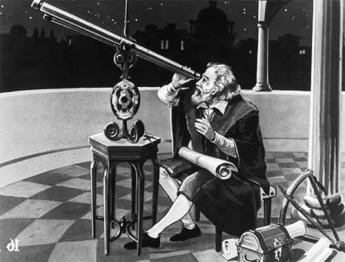
|
| Galileo's invention |
Considering the convulsive upheaval caused by its principles, the 18th Century colonists must be forgiven for misjudging their situation when confronted with a genius like Robert Morris. In barely a moment of time, Morris assembled these ideas into a vastly improved system of government management, immediately proved that it made the country rich, and demonstrated that he had the common sense to make himself rich using the same ideas. Even the idea usually attributed to his friend George Washington, that honesty is the best policy, sounds more like Morris than Washington, and certainly more like Morris than Alexander Hamilton. Only the likes of John Adams protested that honesty came from God. Morris did not deny that was possible, but acted as though it was irrelevant.
Pay attention to the voice of consensus, be quick and alert to occasional innovation, and don't waste your time being crooked. With these three rules, Morris got rich and made his country rich, enraging those who do not think riches should be a universal goal. Don't want to be a millionaire? Plenty of other people will take your place.
Our two-party system began in Appalachia, and one poor soul found himself marooned there. Hugh Henry Brackenridge, a representative of Western Pennsylvania, cried out, "If they would let Mr. Morris alone, he would make Pennsylvania a great people. But they will not suffer him to do it!" Brackenridge was never elected again.
REFERENCES
| Robert Morris: Financier of the American Revolution: Robert Morris: Charles Rappleye: ISBN-10: 1416570926 | Amazon |
Morris Defends Banks From the Bank-Haters

|
| Robert Morris |
IN 1783 the Revolution was over, in 1787 the Constitution was written, but the new nation would not launch its new system of government until 1790. It was a fragile time and a chaotic one. Earlier, just after the British abandoned their wartime occupation of Philadelphia in 1778, Robert Morris had been given emergency economic powers in the national government, whereas the state legislatures were struggling to create their own models of governance, often in overlapping areas. While the Pennsylvania Legislature was still occupying the Pennsylvania State House (now called Independence Hall) in 1778, it -- the state legislature -- issued the charter for America's first true bank the Bank of North America, and in 1784 the charter came up for its first post-war renewal. Morris was a member of the Pennsylvania Assembly both times. Although he was not a notable orator, it was said of him that he seldom lost an argument he seriously wanted to win. Keeping that up for several years in a small closed room will, unfortunately, make you many enemies.

|
| Tavern and Bank |
Morris was deeply invested in the bank, in many senses. He had watched with dismay as the Legislature squandered and mismanaged the meager funds of the rebellion, issuing promissory notes with abandon and no clear sense of how to repay them, or how to match revenues with expenditures. There was rioting in the streets of Philadelphia, very nearly extinguishing the lives of Morris and other leaders, just a block from City Tavern. Inflation immediately followed, resulting in high prices and shortages as the farmers refused to accept the flimsy currency under terms of price controls. Every possible rule of careful management was ignored and promptly matched with a vivid example of what results to expect next. Acting only on his gut instincts, Robert Morris stepped forward and offered to create a private currency, backed by his personal guarantee that the Morris notes would be paid. The crisis abated somewhat, giving Morris time to devise The Pennsylvania Bank, and then after some revision the first modern bank, the Bank of North America. The BNA sold stock to some wealthy backers of which Marris himself was the largest investor, to act as last-resort capital. It then started taking deposits, making loans, and acting as a modern bank. Without making much of a point of it at the time, the Bank interjected a vital change in the rules. Instead of Congress issuing the loans and setting the interest rates as it pleased, a commercial bank of this sort confines its loans to a fraction or multiple of its deposits, and its interest rates are then set by the public through the operation of supply and demand. The difference between what the Legislatures had been doing and what a commercial bank does, lies in who sets the interest rates and who limits the loans. The Legislature had been acting as if it had the divine right of Kings; the new system treated the government like any other borrower. As it turned out, the government didn't like the new system and has never liked it since then. Today, the present system has evolved a complicated apparatus at its top called the Open Market Committee of the Federal Reserve, most of whose members are politically appointed. Several members of the House Banking Committee are even now quite vocal in their C-span denunciations of the seven members of the Open Market Committee who in rotation are elected by the commercial banks of their regions. Close your eyes and the scene becomes the same; agents of the government feel they have a right to control the rules for government borrowing, while agents of the marketplace remain certain governments will always cheat if you don't stop them. This situation has not changed in two hundred years and essentially explains why some people hate banks.

|
| Seigniorage |
That's the real essence of Morris's new idea of a bank; other advantages appeared as it operated. The law of large numbers smooths out the volatility of deposits and permits long-term loans based on short term deposits. Long-term deposits command higher loan prices than short-term ones can; higher profits result for the bank. And a highly counter-intuitive fact emerges, that making a loan effectively creates money; both the depositor and the borrower consider they own it at the same time. And finally, there is what is called seigniorage. Paper money (gold and silver "certificates") deteriorates and gets lost; the gold or silver backing it remains safe in the bank's vault, where it can be used a second time, or even many times.
For four days, Morris stood as a witness, hammering these truisms on the witless Western Pennsylvania legislators. At the end of it, scarcely one of them changed his vote, and the bank's charter was lost. But at the next election, the Federalists were swept back into the majority, defeating the opponents of the bank. Although, as we learn the way democracy works, still leaving them unconvinced of what they do not want to believe.
Tammany: Philadelphia's Gift to New York
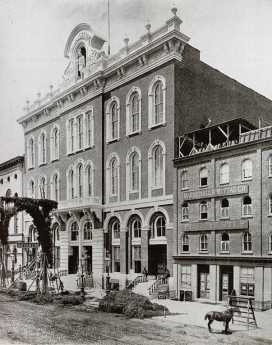
|
| Tammany Hall |
EDWARD Hicks painted a scene over and over, depicting William Penn signing a treaty of peace with the Lenape Indians at Shackamaxon ( a little Delaware waterfront park at Beach Street and E. Columbia Ave.). This scene was apparently a reference to a larger and more finished depiction by Benjamin West. The Indian chief in the painting is Tamarind, chief of the Delaware tribe. Long before Hicks got the idea for the picture from Benjamin West, Tamarind was locally famous for having the annual celebrations of the Sons of St. Tammany named after him. These outings centered on the joys of local firewater and thus may have had something to do with the evolutions of the Mummers Parade. George Washington presided over a lively Tammany party at Valley Forge, and local Tammany Hall clubs sprang up all over the country. The most famous offshoot had its headquarters on 14th Street in New York, as a club within the local Democrat party asserting Irish dominance over New York politics, allegedly using Catholic Church connections to control other immigrant groups. The identity of Tammerend seems to have got thoroughly mixed up along the way; the famous statue of "Tecumseh" at the Naval Academy in Annapolis, much revered by the cadets, is actually a depiction of Tammany.
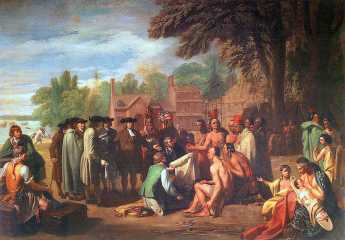
|
| Penn's Treaty With the Indians By Benjamin West |
At earlier times, Tammany was the vehicle Aaron Burr used to assert control of the now-Democrat Party, particularly in the contested Presidential election of 1804. Shooting Alexander Hamilton in a duel, along with disgrace and impeachment as Vice President necessitated Burr's rapid conversion into a non-person, both in New York and in Philadelphia. In Philadelphia, the uproar led to the dispersion of Tammany influence, while in New York other bosses, particularly Boss Tweed, took over the organization and consolidated its role as a small club which dominated a larger political party, which in turn pretty well took over the government of New York City, which in turn dominated the governance of New York State, and even occasionally leveraged itself into national politics. Eventually, Tammany fragmented sufficiently that Mayor Fiorello La Guardia was able to dislodge it from control, which in time led to its dissolution. In a larger sense, however, the decline of New York's Tammany Hall began when in the late 19th Century it adopted the Philadelphia system of consolidating graft from local leaders into unified "donations" from local utilities. That greatly improved the efficiency of collections and disbursements but undermined the need for an effective local organization of ward leaders.
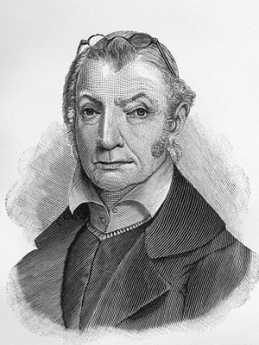
|
| Aaron Burr |
So, although Tammany was originally a Philadelphia creation perfected by New York, it continued to have connections to Aaron Burr in early days, and Philadelphia machine politics later on. But of course for seventy-five years, around here it seemed Republican.
Funding the National Debt
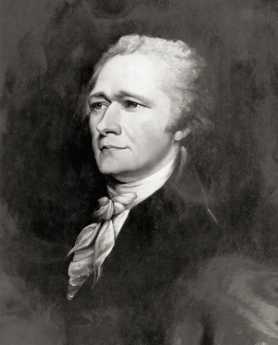
|
| Alexander Hamilton |
Although Alexander Hamilton's arresting slogan that "A national debt is a national treasure" has diverted attention to the underlying idea toward him, Robert Morris had introduced and argued for the same insight in the preamble to his 1785 "Statement of Accounts". The key sentence was, "The payment of debts may indeed be expensive, but it is infinitely more expensive to withhold payment." This fatherly-sounding advice was surely a distillation of a long life as a merchant, and the gist of it may have been passed down to him as an apprentice. Failure to pay your debts promptly and cheerfully results in the world assigning a higher interest rate to your future credit; it is not long before compounded interest begins to drag you down. It doesn't exactly say that, but that's what it means.

|
| Liberty Bond |
Another way of looking at this folk wisdom is that it leads to a simplified method of organizing the finances of an organization. Because higher rates of interest are demanded of long-term borrowing than short-term, it becomes efficient to segregate them. That is, to establish a cash account for every-day transactions, and a separate bond account for a long term, or capital, debt. As bills arrive, they need only be verified for accuracy and sent for payment from either a cash account or a capital account. The original responsibility for agreeing to such debts lies with top management, not the treasurer. The job of the treasurer's office is to pay legitimate bills as quickly and cheerfully as possible, ignoring any imprudence of earlier agreeing to them; rewards will come from lower interest charges and improved credit rating. An unexpected benefit of thus organizing institutions and governments is to make the accounting profession possible. Accountants perform the same function in every business, whether the business is selling battleships or parsnips. The accounting profession made itself computer-ready, two hundred years before the computer was invented.
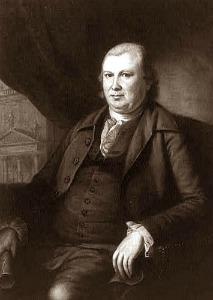
|
| Robert Morris |
In the same document, the retiring national Financier was advising the wisdom of "funding" the war debts, which were largely owed to France, with whom relations were rapidly souring. Lump them all together into a fund, issue bonds and sell them as representations of the nation's capital at the time of issue. Disregard what the money was used for, by either the debtor or the creditor. In spite of appearances, money sequestered in a fund for later payment belongs to the creditor the moment it is promised, not the moment it is transferred. Morris and Hamilton discovered that the fund itself had the property of a bank, in creating money. As long as the creditor did not cash your bonds, he could use them as money, in effect doubling the amount of money you yourself can spend. It was this discovery which so exhilarated Alexander Hamilton, causing him to over-praise the methodology to an already suspicious Congress. Tending toward the teachings of Shakespeare's Polonius, Hamilton's excitable manner caused them to remember, neither a borrower nor a lender is. But Congress was eventually persuaded. The federal government lumped the states' debts together in an "assumption of debts" , consolidated all these various little debts into a single "funded debt", and made the deal work with changing the "residency" of the nation's capital from Philadelphia to the banks of the Potomac. It was called the Great Compromise of 1790.
Morris well understood that a funded system requires some final payor of last resort. Such a payor need set aside only a small portion of the debt for dire contingencies, but his name gets first attention on the list presented to prospective creditors. In 1778 Morris had offered his own personal wealth as that last resort, which the public at the time trusted far more than the Treasury of the United States. Over the next twenty years, he came to realize that the last resort of established nations, no matter what the paper said, was the aggregate underlying wealth of the whole nation. With a vast continent stretching to the West, and countless immigrants clamoring to join from the East, the wealth supporting the debt of the United States in 1790 seemed endless. After two hundred years we have finally begun to accumulate a national debt which equals our Gross Domestic Product, and have only begun to pull back as we observe what happens to other nations who got to that point sooner. Let's hope devising an automatic check and balance does not require a second Robert Morris. Men like him can be hard to find, so limit your debts -- or your nation's debts -- to sixty percent of your assets. Financial geniuses are invited to devise a better debt limit, if they can.
Morris at the Constitutional Convention
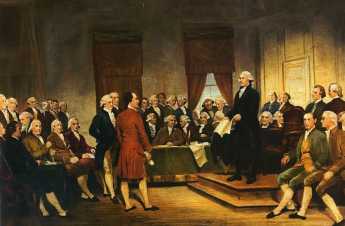
|
| Constitutional Convention 1787 |
TRUE, George Washington was the presiding officer of the Constitutional Convention. But Pennsylvania was the host delegation, so the role of presiding host should have fallen to Benjamin Franklin, the President of Pennsylvania. However, Franklin was getting elderly and turned the job over to Robert Morris, who among other things was rich enough to host some necessary parties. The rules of decorum at that time thus kept Washington and Morris out of the floor debates. The proceedings were, in any event, kept the secret, so occasional frowns or encouraging smiles are not recorded for history.
But Morris had been an active debater in the Assembly and other meetings, so he knew enough to line up a consensus in advance for the matters he thought were essential. Obviously, Morris was strongly in favor of giving the national government power to levy taxes for defense purposes, and Washington whose troops had suffered severely from the inability of the Continental Congress to pay them also regarded this taxing power as the central reason for changing the rules. By making it the central argument for holding the convention at all, Washington, Franklin, and Morris had made taxation power a foregone conclusion. And by giving them what they wanted from the outset, the rest of the convention was in a position to do almost anything else it wanted without open comment from the Titans. The sense of this trade-off was captured by Gouverneur Morris, the editor of the Constitution, in Article I, Section 8:
The Congress shall have Power To lay and collect Taxes, Duties, Imposts, and Excises, to pay the Debts and provide for the common Defence and general Welfare of the United States; but all Duties, Imposts, and Excises shall be uniform throughout the United States;This formulation had the effect of greatly empowering James Madison, the only participant who had studied the inside details intensively and cared about every comma. It also encourages the military to believe that federal taxation was mainly their entitlement, whereas those whose main goals are defined as "the general Welfare" tend to regard defense spending as an unnecessary deduction from their share.
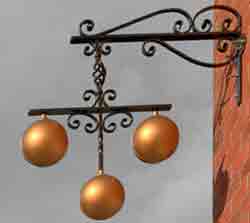
|
| Pawn Broker Sign |
Most of the convention delegates had experience with state legislatures, and Franklin and Morris had spent decades struggling with the weaknesses of legislators. A wink or a quip in a tavern was as good as an hour's speech for reminding the delegates what they already knew about human nature. What was designed as a dual system of powers of taxation, with federal oversight of balanced state budgets combined with federal power to tax on its own in emergencies or unforeseen situations. Since the members of the first few congresses after 1789 were largely the same people as the members of the constitutional convention, many details of this balance were worked out over a few following years. State powers to tax and borrow were tightly constrained, only the federal government could tax and borrow without limit. Since government borrowing is merely the power to defer taxes until later, the borrower of last resort was the U.S. Congress, alone empowered to encumber the wealth of the whole nation in a federal pawn shop window called the funded National Debt. For almost two centuries, this pawn shop window seemed able to support any imaginable expense. Today, we monitor this as the ratio of national debt to Gross Domestic Product (GDP), and we now have a clearer idea what level of that ratio flirts with hopeless inability to pay the federal government's debt. The experts say it's close to a 60% ratio, and unfortunately, almost every nation on earth now exceeds that limit. The system continues to lack an unchallenged definition of its limit, but the system is nevertheless still Morris's system, wrapped in a mountain of descriptive detail by Alexander Hamilton. If a nation borrows more than that and clearly will never repay it, that nation is to some degree a slave to its creditors, with war its only hope if creditors are unrelenting. Perhaps another way to refine the thought is to say that if the nation wishes to mortgage everything it owns down to the last shoe button, the creditors will only accept additional debt if it is proposed by someone with the power to pawn the last shoe button. To foreigners, the proof of who has what power is much more certain if written down. Morris's protege Alexander Hamilton went even further: "credit" is established when creditors can see that somebody is in the habit of getting the nation's bills paid, and "credit" is injured whenever anyone in charge, welches.
Legislative Branch: Two Chambers or One?
The traditional explanation for the two-chamber arrangement of legislative branches is that John Dickinson once crafted a compromise between the big states and the small-state demand for equality. That's accurate, and it's also true that the two-chamber system in Great Britain balances the power claims of the landed aristocracy with the demands of commoners. But only the Pennsylvania legislature of 1777 seems to have addressed head-on the issue of whether, in general, two were better than one. A central issue is whether the two chambers are selected by two distinctive characteristics, not what the characteristics are. By fighting to have only one chamber, the Pennsylvanians inadvertently demonstrated why unicameralism is unwise; shot themselves in the foot, as it were. Big state, little state, or patricians versus commoners, (or any other system of selection) was scarcely a central issue at all; what was essential was to create two bodies, with internal politics necessarily based on different criteria for leadership scheming. Electing representatives for six years rather than two is a minor distinction but it has a certain effect; after all, electing people for life would make a huge difference. Electing geographically, whether by counties as many states do or by state, is not terribly important in itself. What appears to be important is that one body is elected by the population, the other body geographically, and thus there are two different schemes to achieve power. Such differing political machines will seldom agree on a single pinnacle of power, thus undermining one of the central weaknesses of allowing political parties to exist. Washington believed he could achieve this outcome by making it a mark of disgrace to caucus outside of the voting chamber, probably not recognizing that relief from the temptations of tyranny was already built into the system by happenstance.

|
| Founding Fathers |
Bicameral, two-party legislatures seem to soften many of the objectionable features of political parties. Our founding fathers considered many things, but they never made up their minds about enduring political parties. Factions would, of course, appear with each contentious issue, but the modern idea of parties required experience to cope with, and the founding fathers had little experience. They were realists and pragmatists, but the concept of informal little warring governments within the government was a powerful concept they simply did not address. Part of that was due to the implacable resistance of George Washington to the whole idea; no one wanted to confront him on a topic he was so passionate about. His violent temper was famous, and sometimes it was irrational. He expected every senator and congressman to speak his mind on every subject, assuming an equal role from the day he was sworn in. For a while, it almost worked, largely because so many of the early congressmen had been members of the Constitutional Convention, hand-picked to be able to persuade their states to ratify it. But as elections became more routine it became evident that people who were primarily skillful at getting themselves elected would arrive in Congress, only to demonstrate they were lost, ignorant, or preoccupied. They "needed seasoning", out of which grew the seniority system, tending to substitute duration in office for competence and independence of mind; the main idea of seniority was to hold back raw newcomers, just a little. The vast variety of topics for Congress to consider inevitably demonstrated that many congressmen simply did not care what happened to a great many issues, but cared inordinately much about some others. Thus, the newcomers quickly needed a mechanism for trading their votes for "minor" issues in return for voting support on what they thought were "major" issues. As party leaders began to make an appearance, the leader acquired power through the seniority system, which quickly morphed from friendly advice to newcomers, into the warning phrase: "wait your turn".

|
| Henry Clay |
Henry Clay, who had watched the system from the Senate, walked into the House of Representatives in 1811 and was elected Speaker on the first day. He quickly transformed the role of Speaker from an impartial umpire of debate and merged the powers of the Speaker with the powers of the Majority Leader. A supposedly independent Majority Leader still exists but is actually acting the role of the party whip. The true majority leader had pushed the nominal one aside, adding the powers of the speaker to his own. The supposedly impartial Rules Committee is merely an enforcer for the will of the majority party leader, rewarding and punishing Congressional colleagues as the Speaker desires. The volume of work relentlessly increased to over twenty thousand bills a year, so the larger House of Representatives was able to develop specialist experts in many fields which the Senate simply did not have the manpower to parcel out. Those who are familiar with the internal politics of large corporations will recognize the devastating threat of switching such a specialist from a field in which years of experience have been invested, into another field specifically chosen as a punishment, to seem unfamiliar or better still detestable. Speakers and Rules Committees which see themselves as impartial umpires do not do such things. But a power-hungry Majority Leader would laugh about it with his cronies. When a convulsive change of membership like the Tea Party suddenly makes an appearance, abusive leadership has a reason to mellow; but the difference between mellowing and biding your time is a small one.
The Senate has its own rules, so arcane and numerous it takes years to learn them. For present purposes, they are unimportant. The crucial thing is they are different from the House rules and tend to promote a different style of leadership. The leadership of the two bodies thus will usually have a clash of interest, and out of that comes restraint of arbitrary power. A phrase much in circulation within the Tea Party congressmen is that "The other party contains our adversaries, but the Senate contains our enemies." George Washington would not be amused, but Madison would be satisfied.

|
| Boston Tea Party |
The 1777 Pennsylvania Legislature seems to have grasped the idea behind a single Legislative body immediately. The Constitution of the State had been bitterly contested, and one of the main issues was unicameralism. The radicals wanted power for the Legislature, and this was one clear way to enhance it. What the heedless egalitarians did with power once they got it, had a lot to do with persuading the Constitutional Convention ten years later, that John Dickinson's bicameralism had a pretty good idea buried within his Grand Compromise. In retrospect, it can be seen that the victories at Trenton and Saratoga, plus the early successes of the privateer navy, strengthened the other colonies and mostly put moderates in charge; in Pennsylvania however it was the radicals who took over the leadership and started acting on the assumption that radicals were the natural leaders of the rebellion. At least one major cause of this peculiarity was that the British attack was focused on Philadelphia, and moderate forces were forced to flee. While the Continental Congress initially fled to Baltimore as Howe approached Trenton, they briefly returned to Philadelphia until the British were actually on the outskirts of town, and then fled a second time. Because there was general dissatisfaction with Baltimore, this time they went to Lancaster and then across the Susquehanna to the then little town of York. Morris was better prepared than most and had bought the von Stiegal mansion in the Lancaster suburb of Manheim. To the extent it was possible to direct the maritime and financial activities of the Continental Congress from such a distance, he was at least able to do it in moderate comfort. This movement of the Continental Congress may not have caused the radical uprising in Pennsylvania, but it certainly suppressed the moderate forces which would have acted to restrain it.
For practical purposes, The radical legislature got its unicameral wishes and started printing money recklessly, imposing price controls and personal threats against anyone who raised prices. The leaders of the Quakers, with Israel Pemberton ("The King of the Quakers") and several dozen others dumped into oxcarts, were exiled into the Shenandoah Valley of Virginia. James Wilson, obeying a lawyer's duty to defend his clients to the best of his ability, was the target of anger in the streets. A mob of radicals caught the Quakers emerging from the Arch Street meetinghouse and executed two of them. The mob continued a few blocks to James Wilson's house at 3rd and Walnut, and besieged a number of moderates including Robert Morris in the "Battle of Fort Wilson". The moderates were prepared to fight, but the appearance of the First City Troop put an end to the fighting of this revolution within the revolution. To a certain degree, the mob violence seems to have been provoked by food shortages, which were in turn caused by suppression of prices to a level the farmers would not accept. Inflation was raging out of control as the Legislature printed more money and attempted to make farmers accept it by force. A remarkably insightful economist of Philadelphia at the time, Pelatiah Webster, summarized the situation in a few pithy remarks which can scarcely be improved on today. Uncontrolled currency leads to inflation, inflation leads to price controls, and price controls lead to famine. The farmers simply would not sell their abundant crops for such constrained prices, city-dweller starvation notwithstanding. Their action was not violent; they simply withheld goods from the market, waiting for better prices. Price controls were, of course, futile after a very short time. Food riots were the last step before total chaos. Although the fighting stopped, the radicals consolidated their control at the next election, with Robert Morris and others of his sympathizers, turned out of office. After four years of war, things were beginning to fray at the edges.
Bonds--Do They Have A Future?
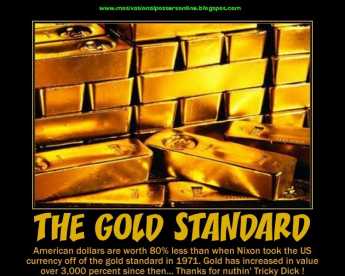
|
| Relic of the Past? |
EVER since we finally went off the gold standard completely during the Nixon Administration, the Federal Reserve has adjusted our money supply to create a fairly steady 2% inflation. If inflation is ever less than 2%, the Fed puts more money into circulation. Since many bonds are paying less than a 2% dividend, everybody who buys and holds them at par will lose money in "real" terms. That is, everyone who buys bonds when they are issued and sells them when they mature will lose spending power. Since they fluctuate in the meantime, it is possible for a trader to buy them when they are undervalued by the market. That trader will possibly make money, but only because someone else lost money. Something like that occurred during the recent financial crash bailout, when interest rates declined from 3% to less than 2% but were repurchased by the Fed as "Quantitative Easing", effectively giving speculators a 33% profit at government expense. But that doesn't happen often, and just guess who ultimately lost the money the speculators made. There is also that daunting question: when the time comes for the Federal Reserve to disgorge them, just who is going to buy all these cheapened bonds? In Japan, bonds paid a dividend of less than the rate of inflation for more than a decade; it's hard to think of a reason why the same thing could not happen in America. So it's also hard to imagine a reason why buy-and-hold investors should not abandon bonds, perhaps suddenly all at once, at some unknown time in the future. At that point, many of them will resolve never to try that, again. The whole idea is troubling.
It's particularly troubling in view of the lack of success, so far, of TIPS. These vehicles are new; perhaps the algorithm is set to ignore minor inflation and will over-respond to more major inflation, ultimately rewarding those who buy them. But at least so far, they are a disappointment. Furthermore, TIPS are quite cleverly designed to be inflation-protected, while unfortunately inflation usually does not follow a straight line but is volatile, or saw-toothed; the jury is still out. The jury better hurry up, because all investors look for net income after expenses, which include brokerage costs, taxes, and inflation. A long-term bond might have to pay a dividend approaching 4%, just to emerge with the same net value it started with; after five years of 4%, you could be 20% behind. And yet, the bond market with or without inflation protection is far larger than the stock market and compares in size with all other kinds of market. Who buys them, especially in these huge quantities?
Somebody must maintain statistics which answer this question, but as a guess, the main buyers are insurance companies, endowments, annuities, hedge funds, banks. And foreigners, of course, to whom our follies seem trivial compared with their own. The great argument for bonds is the safety of principal, and although safety is in question anywhere there is inflation when the topic is cash flow, safety is definitely an issue. Cash shortages are what cause bankruptcies, which are mainly useful in providing time to liquidate underlying wealth to pay restless creditors. The management of a non-profit organization must meet its payroll out of cash flow, so non-profits protect themselves from dissolution by having a regular flow of nominally secure bond dividends. Income from donations and contributions can be particularly weak during times of economic stress. Since most for-profit organizations also experience variable periods of time without profits, their situation does not differ greatly from nonprofits. That's particularly true when a for-profit organization has a vocal, activist stockholder group, who will protest fiercely if the management retains abundant cash. For such a predicament, holding bonds creates safety by some definition. The price of that safety is the long-term average loss on the bond portfolio; the company's alternative losses are whatever it takes to maintain a stable work force during unstable times. The business school assessment of this tradeoff is that bond losses can usually be passed through to the customers as a business cost, while layoffs and strikes may not be.
To restate the characteristics of willing bond purchasers, they are governments and corporations who have no common stock issuance alternatives, but regularly face a need to have money available for payroll. They also include borrowers and lenders at nominal interest rates like banks and insurance companies, who can afford to ignore inflation because their own liabilities are in nominal dollars, or come due at a date certain. And then, there are a host of beneficiaries of special-interest bond provisions, like "Flower bonds", state and municipal governments, foreign aid, student aid, etc. As an overall statement, natural bond buyers are those who either do not possess steady equity (common stock) alternative to offer investors or else are shielded in some way from the inflation and tax costs of buying bonds. Speculators and traders are excluded from the discussion because fixed-income trading is a zero-sum game, something you should teach your children to avoid. Other than these special niche opportunities, bonds should be regarded by the ordinary investor as trading opportunities when interest rates get too high, which is roughly every fifteen years or so.
Things in the bond market were not always so bad; Robert Morris, Jr. was a genius for devising this market in 1784. But the equity market was then not so well developed, life expectancies were shorter, and a minimum 2% inflation was not guaranteed by the Federal Reserve. The income tax had not been invented. It was possible to enjoy the promised benefits of lending in those days, for decades or even lifetimes. It was much harder to find investments of superior performance, without getting involved in business management. Meanwhile, the bond market just got huger and huger. Modifying or dismantling it in logical ways would have enormous disruptive effects. So enormous, the Congress has just adopted the stance called "kicking the can down the road", which is a debt you never seriously intend to repay.
Are we waiting for the bond market, the bond vigilantes, or speculators to find some vital vulnerable flaw, and topple it all into the ashcan of history? Or is there some better plan that no one has mentioned?
Two Friends Create the Articles of Confederation
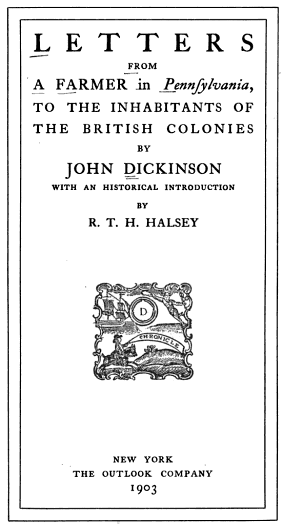
|
JOHN Dickinson had been highly critical of England's treatment of its colonies. As early as 1768 he had written a book called Letters of a Pennsylvania Farmer which is credited with strongly influencing the colonies in the direction of resistance to the British Ministry. When it came time to write the Articles of Confederation, Dickinson was the lawyer selected for the task. His good friend Robert Morris had been less outspoken in opposition to the Ministry's behavior, quite possibly because he was adept at finding workarounds for his own personal business problems. But possibly he was merely maintaining an ambiguous negotiating posture, since in a hotly contested election with this as the main issue, Morris was elected by both sides in the argument. When July 4, 1776, forced the issue both Dickinson and Morris had refused to sign the Declaration, but within a few months both of them were actively fighting for the Rebellion. The truest test of their evolving attitudes might have emerged when Lord North sent the Earl of Carlisle as an emissary after Burgoyne's defeat at Saratoga, offering peace with a sort of commonwealth status for the colonies. Not much is written about this curious episode, leaving it unclear whether the British were serious, and even if they were, whether the Americans understood the offer as serious. On the surface, the British offer conceded taxation with representation as the rebellion had been demanding. But it was rejected by Gouverneur Morris acting for -- who remains unclear. It seems possible the British were exploring the true feelings of people like Dickinson and Robert Morris but were disappointed. The earlier treatment of Ireland after it had agreed to a similar half-hearted autonomy did leave British sincerity in legitimate doubt.
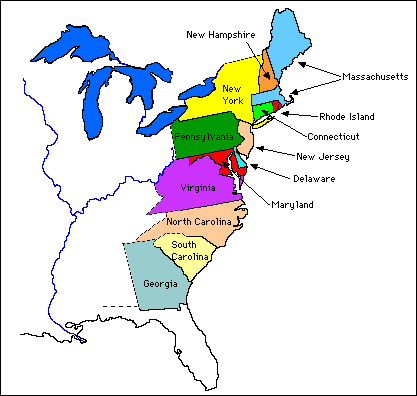
|
| Thirteen |
The thirteen colonies had united to fight the British King, but many of them were reluctant to unite for any other time or purpose. Rhode Island was perhaps the extreme example of this view of what Independence was supposed to mean, but the feeling existed to some degree in many colonies. Concern for the power of this feeling of tentativeness may have contributed an important reason the Articles placed heavy emphasis on declaring the document to represent a perpetual arrangement. Recognition of the weakness of this intent may have been an important reason why George Washington was later willing to sweep the issue aside, even though he of all people was most concerned to avoid the appearance of acting as an arbitrary king. For these and other reasons mainly revolving around state boundary disputes, the Articles remained unratified for years. Finally, in 1781 Robert Morris became convinced that failure to ratify was encouraging the states not to cooperate, and successfully pushed ratification through its steps. At that time, Morris was effectively running the country, even providing his own credit and funds to do it. People were reluctant to oppose his wishes, but they were also unwilling to provide the taxes, supplies, and troops that Morris imagined were being blocked by failure to ratify. Ratification of the Articles accomplished very little except to convince Morris: the Articles were flawed and must be replaced with something conferring more central power.
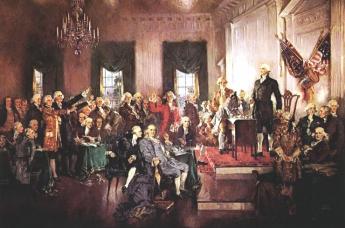
|
| The Goal: 1787 |
Little is known about the evolution of Constitutional thought in Morris' mind between 1781 and the Constitutional Convention in 1787, although a great deal is known about his other numerous activities. It is clear, however, that his experience with the recalcitrant Pennsylvania Legislature had been dismal, while he came to see the one insurmountable flaw in the current Federal government was its inability to levy taxes and consequently, to service national debt. The states were able to levy taxes under the Articles but erratic in doing so, resorting to paper money inflation at the first sign of tax resistance. In Morris' view, the key to the effective government was to reverse the situation; let the national government tax, let the states spend. The key to such rearrangement would be to permit the national government to spend on a very limited list of vital purposes, but bedazzle the states with a substantially unlimited shopping list if they thought they could afford it. As the accounts to pay for the Revolutionary War totaled up, it was apparent that the National Government had twice as much debt as the states. Therefore it would at most, need twice the state taxing power to service such a debt; presumably, wars would be infrequent and it would be less than that. Pay this one off, and potentially the need for future federal spending would be small. Indeed, under the presidency of James Monroe, the national debt was completely paid off, although briefly. It was almost as if Robert Morris and his pupil Alexander Hamilton had a crystal ball.
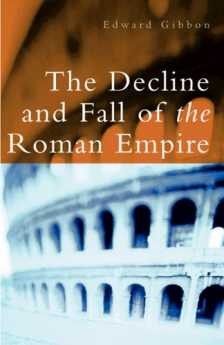
|
| Decline and Fall, Anyone? |
Robert Morris was brilliant and had six years to fashion his strategy, but he also had some help. For one thing, George Washington lived next door much of that time. By then, almost no one dared confront Washington. Adam Smith had written his book The Wealth of Nations in 1776, and Morris gave this extraordinary work as presents to his friends. Morris had corresponded with Necker, the genius financier of France, and through his good friend Benjamin Franklin, gathered insights from the rather advanced British national finance. And James Madison brought in scholarship about politics and statecraft accumulated by Witherspoon, Hume and the Scottish enlightenment. The year 1776 was a remarkable moment for new ideas. In that year, Edward Gibbon also published the first volume of The History of the Decline and Fall of the Roman Empire. The warning behind that important book had an important impact on the minds of important thinkers of the era, too.
Once you grasped all the central ideas, in this environment the resulting strategy almost worked itself out.
Roberts the Second
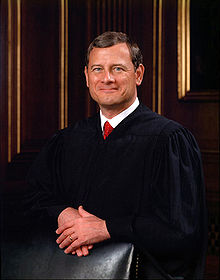
President George W. Bush nominated John Roberts to be Chief Justice of the U.S. Supreme Court in 2005. Since then, the Chief's administrative changes to the court and the whole court system have been slow but methodical. To the extent the Chief Justice has control of the matter, Roberts has been taking steps which make the Court into a more thoughtful branch of the Federal Government, ultimately making it more powerful. His first step was to reduce the number of cases considered each year, constraining them to conflicts between lower jurisdictions, unless otherwise mandated. This year, the number of cases heard is about eighty, or only half of the previous numbers. The policy lets unconflicting Appellate judgments stand. A second court must disagree with the first one, for the Supreme Court to enter the case.
The so-called Obamacare case, (NFIB v. Sebelius), meets this conflict-between-jurisdictions standard, but is notable for other innovations. The case was nationally broadcast as a live slide show. It heard arguments lasting three days instead of the usual single hour, and of course, it broke new substantive ground in a case of national interest. The decisions will now get more press attention; but this relatively rapid evolution toward a national debating contest, through modified Court procedure, is more important than it looks. It would be saying too much to claim the whole nation now fully understands its Constitution of enumerated powers, but surely the citizens who have only recently learned something about it must number in the millions. Before this case, many law school graduates might have had difficulty describing the design of the federalized system in a plausible dinner-table conversation. It's not yet clear where John Roberts is going, but he is surely trying to bring the public along with him.
During the semi-televised arguments, I was at first impressed with the rapid-fire exchanges between Justices and litigators about the operation of health insurance. Some people are born with high-speed brains and high-speed speech apparatus; no doubt, such people are sought after to represent others in court. But after practicing Medicine for sixty years and writing books about health insurance, I recognized that several rapid-fire responses by the attorneys were confident but off-target. Frankly, if you only have a few minutes but many points to make, and have to say them before someone interrupts, you would almost have to be a circus freak to manage. This is quite unnecessary, no matter how entertaining it may be to other lawyers. There seems no reason why the questions cannot be submitted in writing, sometimes employing experts on the specific points, and allowing enough time without interruption to devise a thoughtful answer. At present, it seems to matter more what the litigating attorney will agree to, than what is the fact. The outcome of cutting a litigant off after he says, "Yes, your honor, but.." is now only to establish whether both sides agree on a point; just why they agree or disagree is not even sought, let alone disregarded. It would seem useful to know Justice Thomas' reasons for abstaining from questions during oral arguments, for a different sort of example. So, it is easy to imagine that John Roberts has some thoughtful goals in modifying Supreme Court traditions, and equally understandable if jurists of this distinction become irritated by suggestions from the peanut gallery. It is thus fitting that we all hold back and first watch where the varsity means to take us. But allowing the public to express an opinion, is not the same as lobbying for it.
The Obamacare Act was about 2600 pages long, and two years after the President signed the bill, more than half of the necessary regulations remain to be written. The Law is "not severable", which is to say individual pieces of it cannot be attacked in court, without potentially upsetting decisions made on other portions. As a consequence, both the good and bad parts could endure for a long time to come. Or, the whole thing could suddenly sink from sight, relatively quickly. If the Justices can tolerate it, this legislation with many "moving parts" could be in the courts for a long time to come. So, Justices will then find the rule Roberts has made, of only accepting conflicts between the jurisdictions, protects their time and patience. But in doing so it will shift most final judgments into the hands of the lower, appellate courts. The legal profession will like this quite a lot. It will be like the gratifying situation said to prevail when a commanding General decides to retire -- everybody down the line could get promoted one notch.
By artfully selecting cases to argue, there were here four points open to the decision. Only two of them eventually had bearing on the final outcome of this case, but the whole issue is not necessarily concluded. The first decision got the most attention, deciding that the penalty for not having health insurance could be read as just a tax, and therefore was legal for Congress to use as a Constitutional basis for making health insurance mandatory, as Roberts declared the "Commerce clause" was not. The distinguishing feature of a Congressional exaction which is "just a tax" appears to be whether it exceeds the expenditure intended; if it exceeds the expenditure it would presumably be punitive. Nothing had seemed more important to the Founding Fathers than to expand the ability of the national government to impose taxes to service war debts. To truncate this wish of George Washington and Robert Morris into a short-cut, "Congress has the right to tax", or conversely to expand its confining language into "Congress has the right to tax in order to make private health insurance compulsory" just points up that the only real purpose of taxes in Washington's day was to wage war, and that the purpose of allowable taxes probably would have been defined if other purposes had been foreseen. Someone could usefully point out that what the Constitution really means is that Congress has the right to tax for "defense and the general welfare", and challenge anyone to argue otherwise. One sees the clever hand of Gouverneur Morris fuzzing up that argument; are we to ignore the fungibility of money and ask whether Congress may spend money on the general welfare only if it is general? How about earmarks, for example, are they all for the general welfare?
However, to turn a blind eye toward interesting issues is apparently a price that must be paid for obtaining the right for the Chief Justice to write the majority opinion, which eventually slips in some language (in legal language, an obiter dictum) to the effect that , of course, you couldn't use the Commerce Clause to do that. Getting Justice Ruth Ginsburg to sign that will eventually sound like the box John Marshall constructed in Marbury v. Madison. If that obiter dictum is as heat-resistant as the opinions of the first Justice Roberts in Franklin Roosevelt's court-packing effort, then the Commerce Clause is likely to be off-limits for a long time. Of course, if Chief Justice Roberts had joined the other four conservatives he would still have been able to write the majority opinion, but in the opposite direction. Except of course for that inevitable political accusation: There you go again, you 5-4 conservatives.
The second decision, in this case, is the sleeper. Congressional managers in charge of writing the bill had finally decided they had no way to cover 40 million uninsured people, except by diverting fifteen million of them into what is acknowledged to be the absolutely worst part of the American medical system, the state Medicaid programs. And because many States Rights advocates were in charge of state Governor's offices, the Congressional bill-writers added what is now a fairly familiar prod to cooperation. That is, if a state refuses to take the extra Medicaid patients, it will lose all federal funds for existing clients of state Medicaid. This sort of coercive provision has become so standard in highway bills and other federal programs operating at the state level, that it was largely unnoticed in the 48 hours the Congress was given to examine 2600 pages of legislative provisions. This, however, is blackmail, said John Roberts, quite unallowable under the defined separation of powers of the Constitution, between the state and federal levels of government. Furthermore, if some state decides to accept the penalty, it could close the existing program for the poor and accept the subsidy for the middle class, thus enhancing their revenues and reducing their obligations to the poor. Congress must now devise new strategies for suggesting federal programs to the states, and probably will do so. But the financial blackmail strategy now has a permanent black eye, with a skeptical public eye on the alert for it. The ironic conclusion of all this comes from the Congressional Budget Office, which predicts we will end up with 30 million uninsured persons, anyway.
What's awkward about this was immediately pointed out by attorney Richard Epstein: it ignores the century-old precedent set by Chief Justice Taft. Writing about a Child Labor law, Taft created a Supreme Court precedent that the Constitutional taxing power of the national government may not be used to implement what cannot be implemented directly. We can now see an example within the borders of a single case, where the Constitutional taxing power provision is used to indicate an otherwise impermissible Obamacare, and a few pages later its use is forbidden in the case of Medicaid in order to accomplish a forbidden coercion. Locating the two issues in the same case decision helps make the distinction between using the taxing power for revenue, and using it to coerce obedience; the distinction grows as the magnitude of the tax grows, particularly after it exceeds the intended government expenditure. What is not emphasized is the basis for Chief Justice Roberts reversing the precedent set by Chief Justice Taft on the same topic a century earlier. He did it with the Obiter dictum, and yet he didn't exactly do it. The four liberal Justices who co-signed the decision are not in a position to dispute it, while the four conservative Justices may not wish to. In either direction, however, the vote of the current Chief Justice appears to be both decisive and subtle.
It remains to be seen whether the 'tax, not commerce' strategy was clever. If the tax approach proves to be durable, it presumably extends to a wide range of legislation since Roosevelt's New Deal. Already, its awkward features have emerged in renaming portions of Obamacare into Chapter 48 of Subtitle D of the Internal Revenue Code of 1986 (!). Any law student who tries to look that up is going to have a frustrating time. But on the other hand, sometimes you win by losing. If it should somehow not be a tax, it has already been excluded from the Commerce Clause, so it has no hook left in the Constitution on which to hang it. There's something in this whole wrangle which resembles the position of Germany and Japan after the Second World War. In spite of losing that war, those two nations seem to have prospered better than England and Russia, who lost their empires but are said to have won the war .
20 Blogs
Robert Morris Invents American Banking
 It's now hard to imagine getting along without banks, but Robert Morris had to invent the idea in 1780. Many people were horrified.
It's now hard to imagine getting along without banks, but Robert Morris had to invent the idea in 1780. Many people were horrified.
Limits of Leverage
 The American Revolutionary War was supposed to lead to paradise, but nobody was very happy with the state of affairs it left behind.
The American Revolutionary War was supposed to lead to paradise, but nobody was very happy with the state of affairs it left behind.
Constitutional Liberty
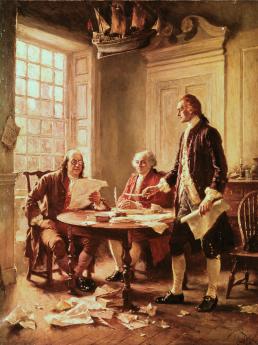 Robert Morris refused to sign the Declaration of Independence because what he really wanted was Constitutional Liberty. He didn't even mind being a British subject and didn't want a different King. What was this all about?
Robert Morris refused to sign the Declaration of Independence because what he really wanted was Constitutional Liberty. He didn't even mind being a British subject and didn't want a different King. What was this all about?
Who Paid for the Revolutionary War?
 Great Britain lost the war with the American colonies and paid for considerable costs. But France was the main financial loser in the sense that it couldn't afford what it lost.
Great Britain lost the war with the American colonies and paid for considerable costs. But France was the main financial loser in the sense that it couldn't afford what it lost.
Power of the Purse
 Establishing and revising a national debt limit was a mistake in 1917. Its mistakenness becomes progressively more evident as national debt approaches the point where we could not possibly pay it off, and several foreign countries demonstrate what can then happen.
Establishing and revising a national debt limit was a mistake in 1917. Its mistakenness becomes progressively more evident as national debt approaches the point where we could not possibly pay it off, and several foreign countries demonstrate what can then happen.
Robert Morris Has a Mid-Life Crisis
 Robert Morris baffled everybody by abruptly abandoning his merchant career at the peak of his power. It remains a puzzling action, but somehow it displays American society's confusion as the Industrial Revolution confronted the last of the Enlightenment.
Robert Morris baffled everybody by abruptly abandoning his merchant career at the peak of his power. It remains a puzzling action, but somehow it displays American society's confusion as the Industrial Revolution confronted the last of the Enlightenment.
The Third Pennamite War (1778-1784)
 Connecticut and Pennsylvania stopped fighting during the Revolution, but then promptly resumed hostilities. The Decision of Trenton gave the prize to Pennsylvania, whose legislature promptly abused the helpless remaining Connecticut settlers.
Connecticut and Pennsylvania stopped fighting during the Revolution, but then promptly resumed hostilities. The Decision of Trenton gave the prize to Pennsylvania, whose legislature promptly abused the helpless remaining Connecticut settlers.
A Change of Era
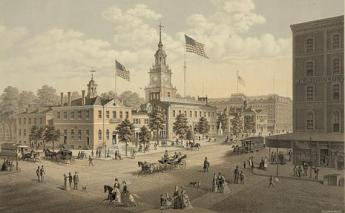 Few historical eras burst upon the world with the suddenness of the American one. It took place in Independence Hall, all right, but even more decisively in 1798 than 1776.
Few historical eras burst upon the world with the suddenness of the American one. It took place in Independence Hall, all right, but even more decisively in 1798 than 1776.
Morris Upended by a Nobody
 Adjusting to winning the Revolutionary War was almost as painful as losing it would have been. Especially for Robert Morris.
Adjusting to winning the Revolutionary War was almost as painful as losing it would have been. Especially for Robert Morris.
Two-Party Ideologies
 It's curious how often the two American political parties have switched positions on the main issues of the day.
It's curious how often the two American political parties have switched positions on the main issues of the day.
Ginseng Trading
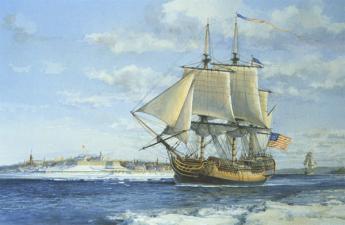 The Chinese love ginseng for its alleged aphrodisiac qualities, so it is not surprising that trade has flourished between China and Philadelphia. What's surprising is that ginseng flourishes in our exurbs, and is mostly exported to China, not from it.
The Chinese love ginseng for its alleged aphrodisiac qualities, so it is not surprising that trade has flourished between China and Philadelphia. What's surprising is that ginseng flourishes in our exurbs, and is mostly exported to China, not from it.
Statement of Accounts, March 1785
 At the conclusion of Robert Morris' term of office as Financier, he did an unusual thing by submitting a complete accounting of his term. As things turned out, it was a good thing he did so.
At the conclusion of Robert Morris' term of office as Financier, he did an unusual thing by submitting a complete accounting of his term. As things turned out, it was a good thing he did so.
Morris Defends Banks From the Bank-Haters
 To understand why lots of people today reflexly hate bankers, it's useful to review the courtroom defense of the man who invented America's first bank, facing ruin if he proved unconvincing.
To understand why lots of people today reflexly hate bankers, it's useful to review the courtroom defense of the man who invented America's first bank, facing ruin if he proved unconvincing.
Tammany: Philadelphia's Gift to New York
 All the bad things they say about Tammany Hall are somewhat true. William Penn, George Washington, and Aaron Burr can be happy that Tammany Hall is now mostly a New York tradition, its Philadelphia origins long forgotten.
All the bad things they say about Tammany Hall are somewhat true. William Penn, George Washington, and Aaron Burr can be happy that Tammany Hall is now mostly a New York tradition, its Philadelphia origins long forgotten.
Funding the National Debt
 Funded debt, otherwise known as Capitalism, was a gift to the nation from Robert Morris, Jr.
Funded debt, otherwise known as Capitalism, was a gift to the nation from Robert Morris, Jr.
Morris at the Constitutional Convention
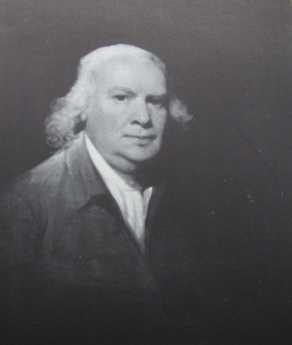 Robert Morris knew that credit is only extended to someone with a reputation for paying his bills.
Robert Morris knew that credit is only extended to someone with a reputation for paying his bills.
Legislative Branch: Two Chambers or One?
 The Romans, two thousand, and the Icelanders, one thousand years ago, developed parliaments that served as models for our own Congress. They were unicameral, however. Bicameralism had the model of the British Parliamentary system, but the Aristocratic House of Lords is currently being whittled away. The Pennsylvania Constitution of 1777 seems to have been one of the few to recognize how important the distinction is, and shows why two are better than one. The British better go back to the Thirteenth century and start over.
The Romans, two thousand, and the Icelanders, one thousand years ago, developed parliaments that served as models for our own Congress. They were unicameral, however. Bicameralism had the model of the British Parliamentary system, but the Aristocratic House of Lords is currently being whittled away. The Pennsylvania Constitution of 1777 seems to have been one of the few to recognize how important the distinction is, and shows why two are better than one. The British better go back to the Thirteenth century and start over.
Bonds--Do They Have A Future?
 It's increasingly hard to imagine why investors buy bonds because it's increasingly difficult to imagine an end to inflation.
It's increasingly hard to imagine why investors buy bonds because it's increasingly difficult to imagine an end to inflation.
Two Friends Create the Articles of Confederation
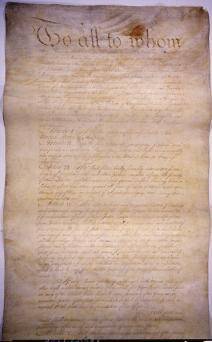 John Dickinson and Robert Morris were good friends who pushed the Articles of Confederation through to ratification. Both of them had been active critics of Great Britain's treatment of the colonies, but both hesitated to sign the Declaration, and both later relented and fought for Independence. Dickinson's final position is less clear, but it was Morris who first saw the weakness of the Articles, and pressed on for their replacement by the Constitution.
John Dickinson and Robert Morris were good friends who pushed the Articles of Confederation through to ratification. Both of them had been active critics of Great Britain's treatment of the colonies, but both hesitated to sign the Declaration, and both later relented and fought for Independence. Dickinson's final position is less clear, but it was Morris who first saw the weakness of the Articles, and pressed on for their replacement by the Constitution.
Roberts the Second
 Chief Justice John Roberts seems to be intent on radical changes to the Supreme Court, made in a conservative way.
Chief Justice John Roberts seems to be intent on radical changes to the Supreme Court, made in a conservative way.